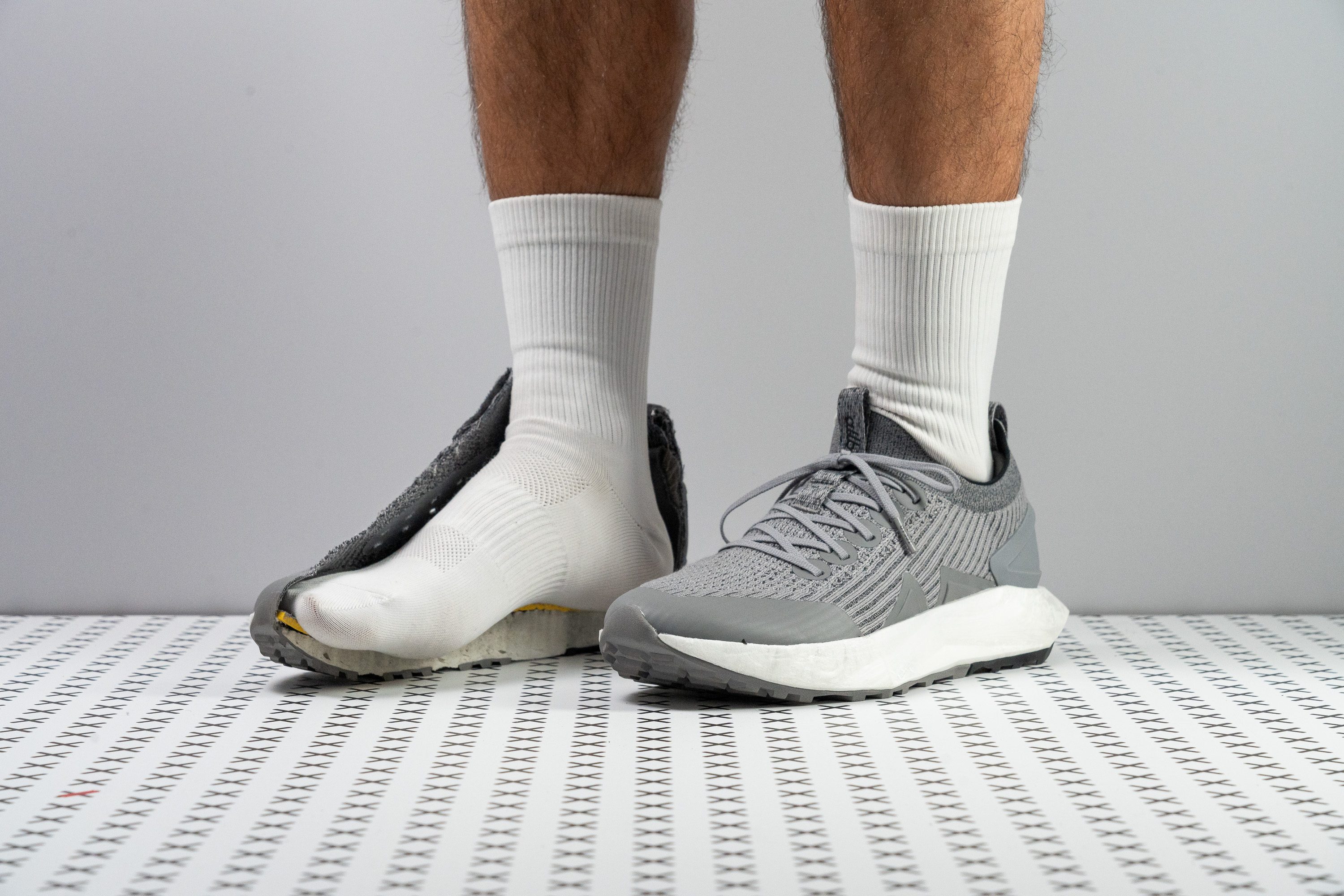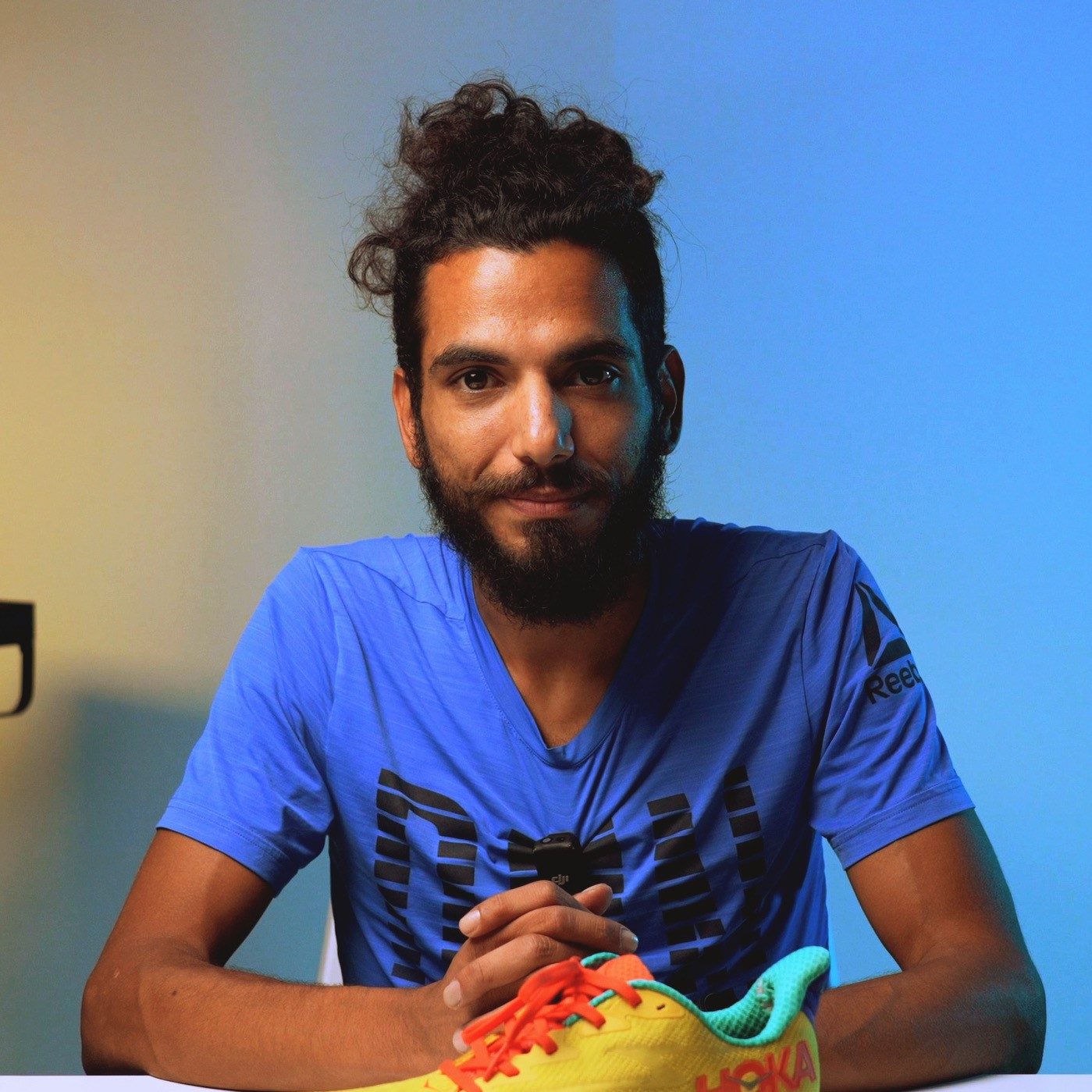Our verdict
Pros
- Environmentally friendly
- Breathable knit upper
- Good impact dampening
- Snug sock-like fit
- Accommodating toebox
- Secure heel hold
- Quite flexible and comfy
- Smooth and stable ride
- Works as a walker or gym shoe
Cons
- Quite heavy
- Pricey for a daily trainer
- Not so responsive
Audience verdict
Comparison
The most similar running shoes compared
+ + Add a shoe | |||||
|---|---|---|---|---|---|
| Audience score | 86 Good! | 89 Great! | 81 Good! | 79 Good! | |
| Price | £160 | £80 | £90 | £65 | |
| Pace | Daily running | Daily running | Daily running | Daily running | |
| Shock absorption | - | Low | Low | Moderate | |
| Energy return | - | Low | Low | Low | |
| Traction | - | Low | Moderate | Moderate | |
| Arch support | Neutral | Neutral | Neutral | Neutral | |
| Weight lab Weight brand | 10.3 oz / 293g 10.6 oz / 300.5g | 8.5 oz / 241g 9.2 oz / 260g | 10.5 oz / 298g 10.8 oz / 305g | 9.7 oz / 275g 9.7 oz / 275g | |
| Lightweight | ✗ | ✓ | ✗ | ✗ | |
| Drop lab Drop brand | 8.1 mm 8.5 mm | 9.3 mm 10.0 mm | 8.6 mm 10.0 mm | 7.8 mm 8.0 mm | |
| Strike pattern | HeelMid/forefoot | HeelMid/forefoot | HeelMid/forefoot | Mid/forefoot | |
| Size | Slightly small | True to size | True to size | True to size | |
| Midsole softness | Balanced | Balanced | Balanced | Balanced | |
| Difference in midsole softness in cold | Small | Normal | Big | Small | |
| Toebox durability | Good | Good | Decent | Bad | |
| Heel padding durability | Decent | Good | Decent | Good | |
| Outsole durability | Good | Decent | Decent | Decent | |
| Breathability | Moderate | Breathable | Moderate | Moderate | |
| Width / fit | Medium | Medium | Medium | Medium | |
| Toebox width | Medium | Medium | Narrow | Medium | |
| Stiffness | Stiff | Moderate | Moderate | Moderate | |
| Torsional rigidity | Stiff | Moderate | Stiff | Moderate | |
| Heel counter stiffness | Moderate | Moderate | Stiff | Stiff | |
| Heel lab Heel brand | 32.1 mm 30.5 mm | 29.7 mm 30.0 mm | 33.0 mm 34.0 mm | 31.2 mm 31.0 mm | |
| Forefoot lab Forefoot brand | 24.0 mm 22.0 mm | 20.4 mm 20.0 mm | 24.4 mm 24.0 mm | 23.4 mm 23.0 mm | |
| Widths available | Normal | Normal | Normal | NormalWideX-Wide | |
| Orthotic friendly | ✓ | ✓ | ✓ | ✓ | |
| Season | All seasons | SummerAll seasons | All seasons | All seasons | |
| Removable insole | ✓ | ✓ | ✓ | ✓ | |
| Ranking | #192 Top 50% | #114 Top 30% | #315 Bottom 18% | #336 Bottom 12% | |
| Popularity | #331 Bottom 14% | #126 Top 33% | #105 Top 28% | #70 Top 19% |
Who should buy
We recommend the Allbirds Tree Flyer 2 as an excellent choice for:
- Environmentally conscious runners who want a planet-friendly option that has a much smaller carbon footprint to produce
- Neutral runners looking for a well-cushioned and comfy daily trainer
- Runners in warmer climates looking for a shoe with
- Active folks in the market for a versatile and durable shoe that can take on light trails and other fitness activities
- Style-minded individuals looking for a sleek and geometric design that's good for strutting about town
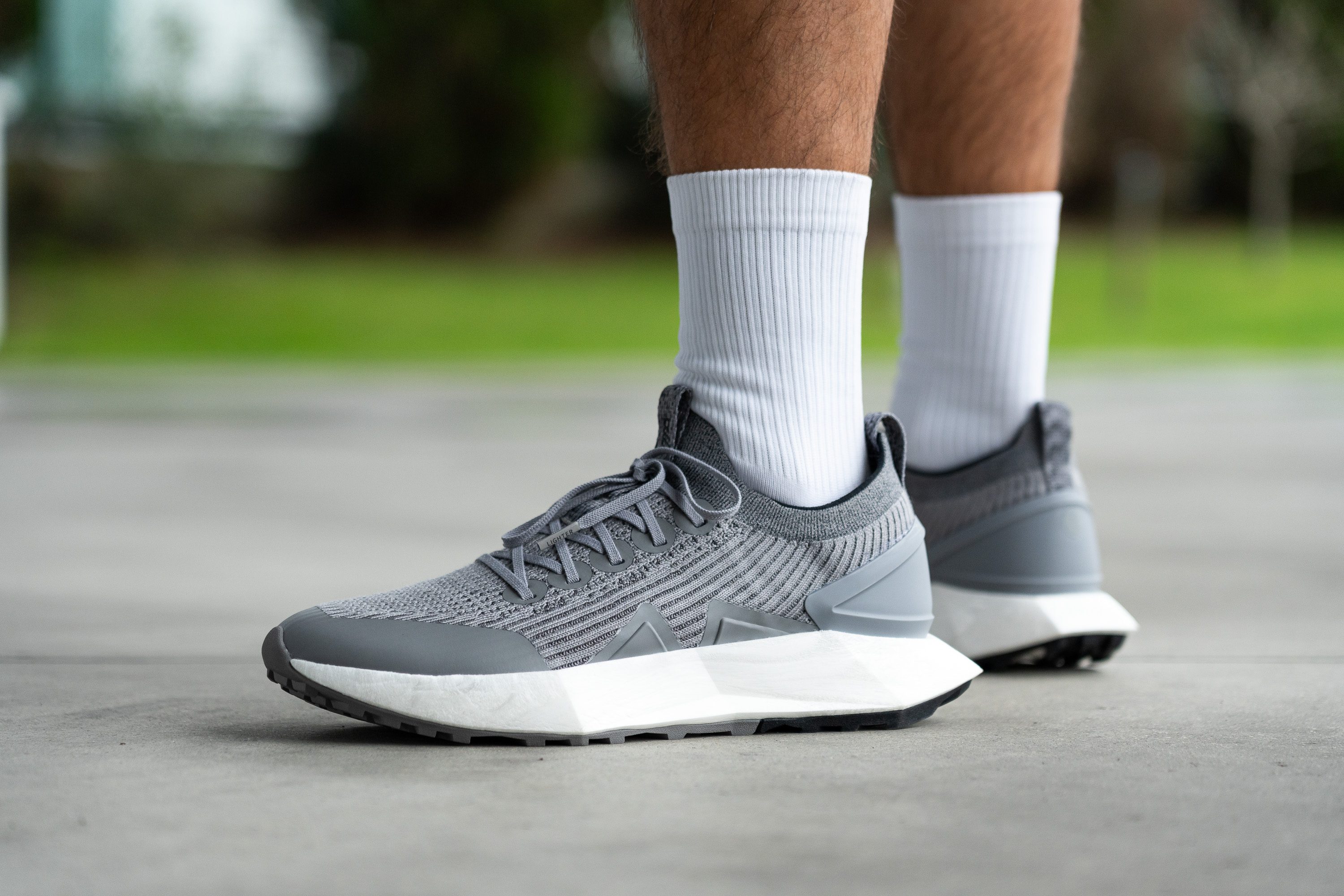
Who should NOT buy
With its £160 price tag, the Tree Flyer 2 might be prohibitively expensive for most runners, especially for a daily trainer. We recommend checking out the Brooks Trace 2 as a more budget-friendly alternative that also makes use of recycled materials in its construction.
The Tree Flyer 2 is a daily trainer that's best suited to less intense runs over short to moderate distances. For runners who want a shoe that is better suited to mile-gobbling long-distance sessions, we suggest the similarly stacked Brooks Launch 10 or the much more cushioned On Cloudmonster instead.
When it comes to speedier runs, we recommend checking out the Hoka Mach 5 as a snappier alternative.
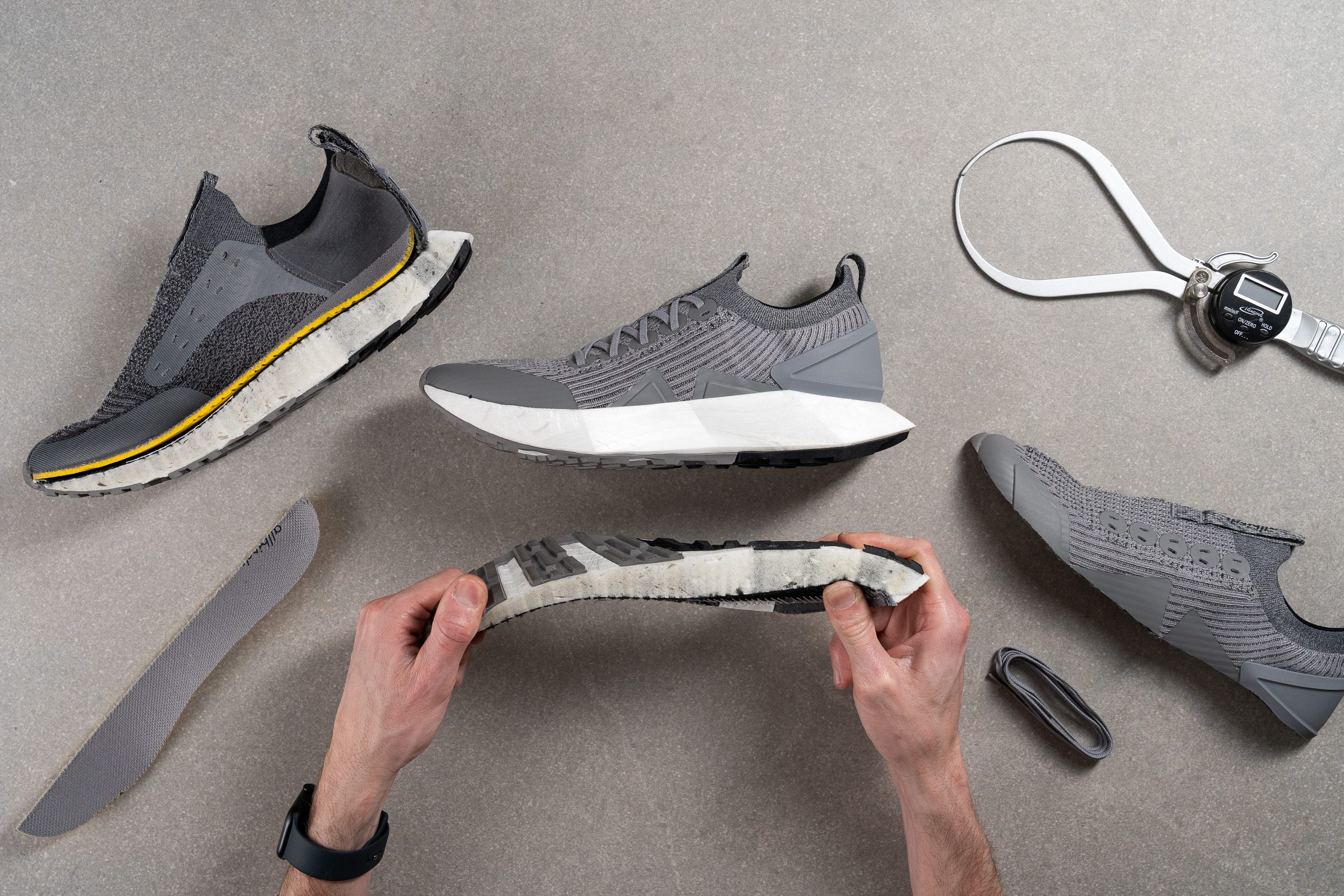
Tipping our scale at 10.3 oz (293g), the Tree Flyer 2 is heavier than the average road shoe. For those who prefer a more lightweight daily trainer, we recommend the feathery Saucony Kinvara 14.
Cushioning
Heel stack
At 32.1 mm thick according to our calliper measurements, the Tree Flyer 2's heel stack is just shy of our current lab average. This is still a good amount of foam underfoot to ensure well-cushioned and protective landings during our less intense daily runs. However, long-distance runners will be better served by a shoe with a higher stack like the On Cloudmonster instead.
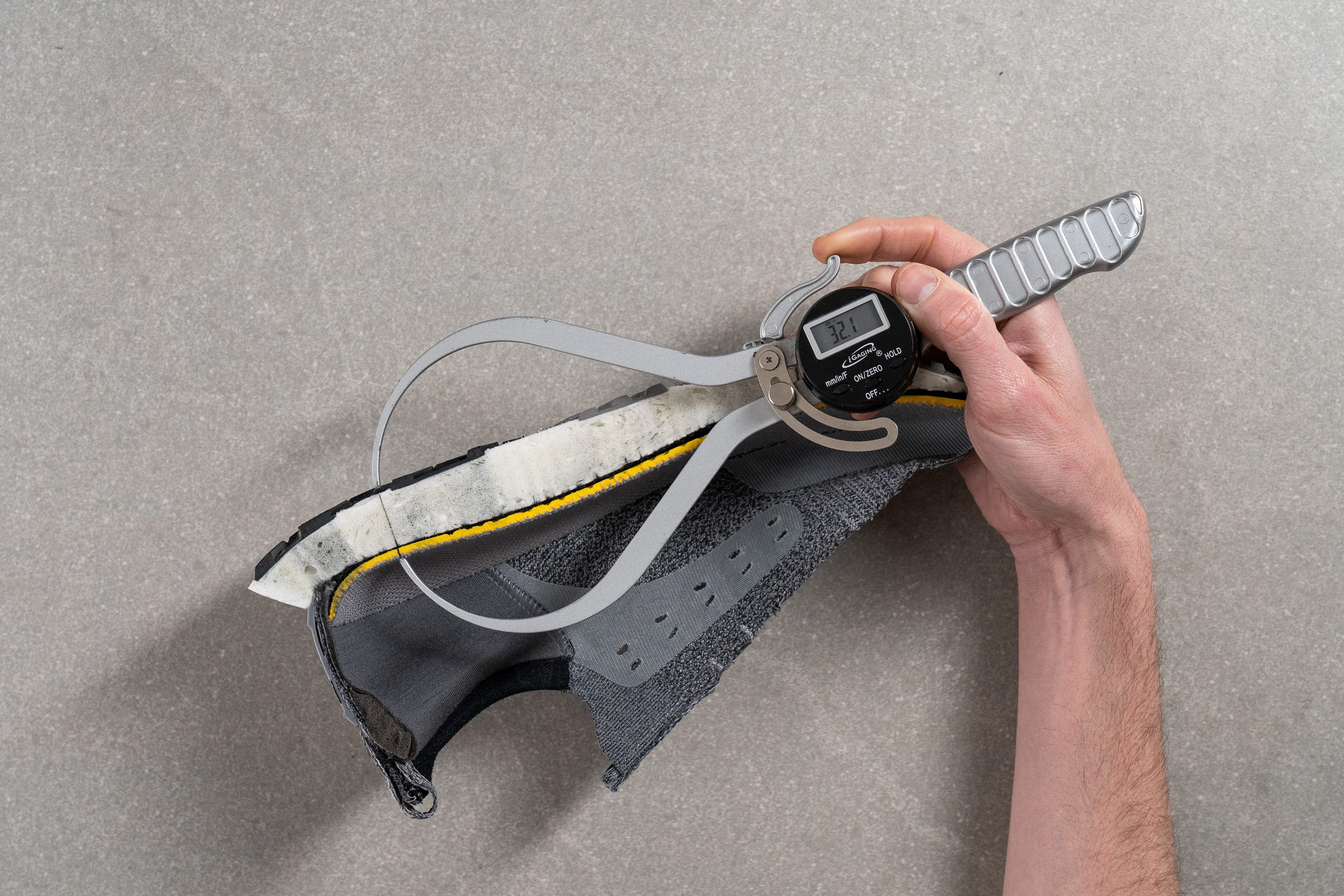
The Tree Flyer 2's heel also extends outwards, which is beneficial for runners with a heel-striking stride and also makes the shoe feel very comfortable whenever we take it out for a walk.
| Tree Flyer 2 | 32.1 mm |
| Average | 34.8 mm |
Forefoot stack
Up at the forefoot, the Tree Flyer 2's stack is right on par with our current lab average at 24 mm thick according to our caliper. This means that forefoot strikers should also enjoy landings protected from impact in this shoe while still getting some sense of the ground below for intuitive toe-offs.
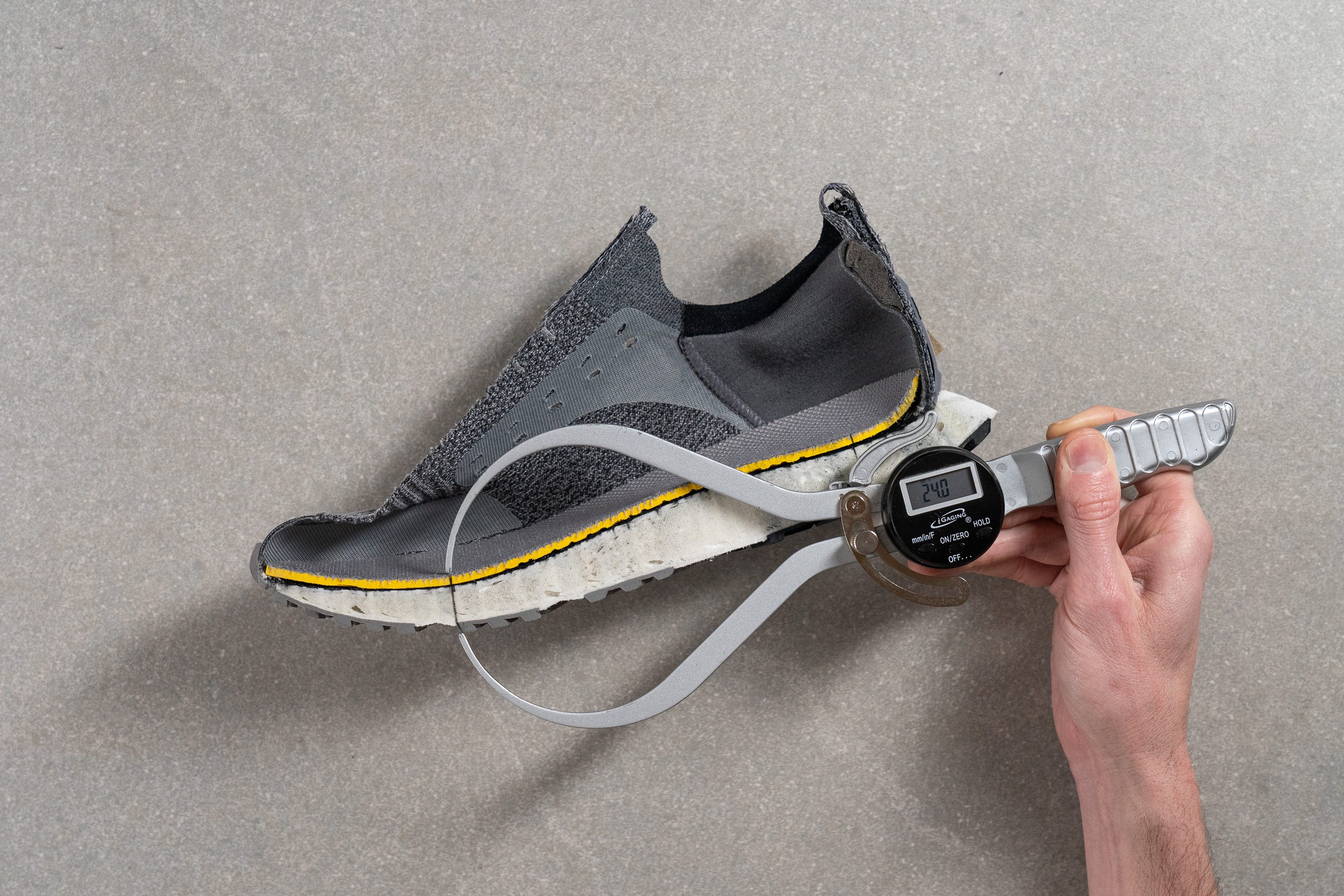
| Tree Flyer 2 | 24.0 mm |
| Average | 26.2 mm |
Drop
The difference in our stack measurements leaves the Tree Flyer 2 with a drop height of 8.1 mm, making the brand-stated drop of 8.5 mm laudably accurate. This offset isn't too steep and should suit the needs of most runners regardless of footstrike.
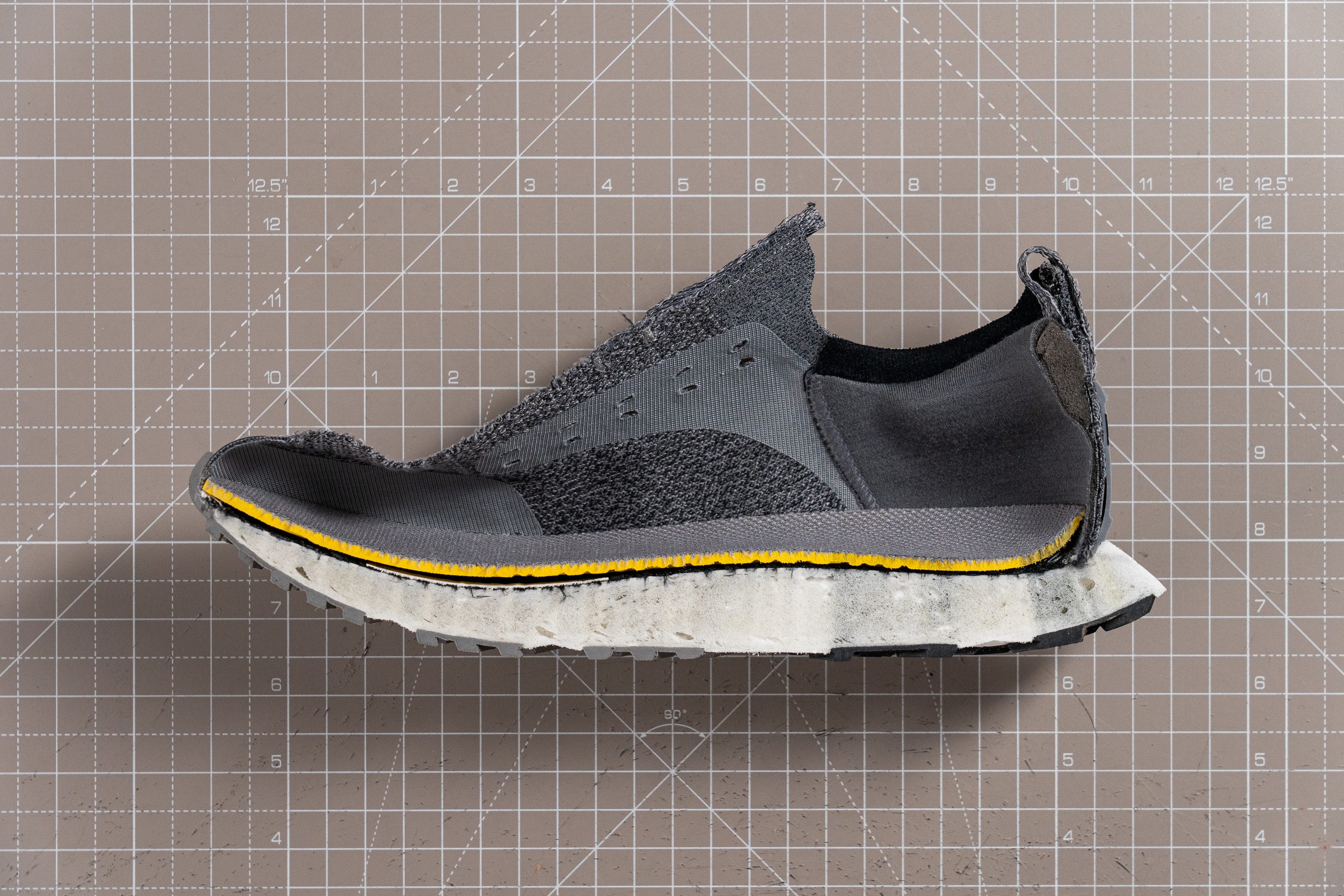
| Tree Flyer 2 | 8.1 mm |
| Average | 8.6 mm |
Midsole softness
We pressed our durometer against the SwiftFoam midsole and got a reading of 22 HA. This isn't exactly plush but it feels quite forgiving underfoot; baffling the impact of our landings with a soft touch that nicely mutes out the harsh road below.
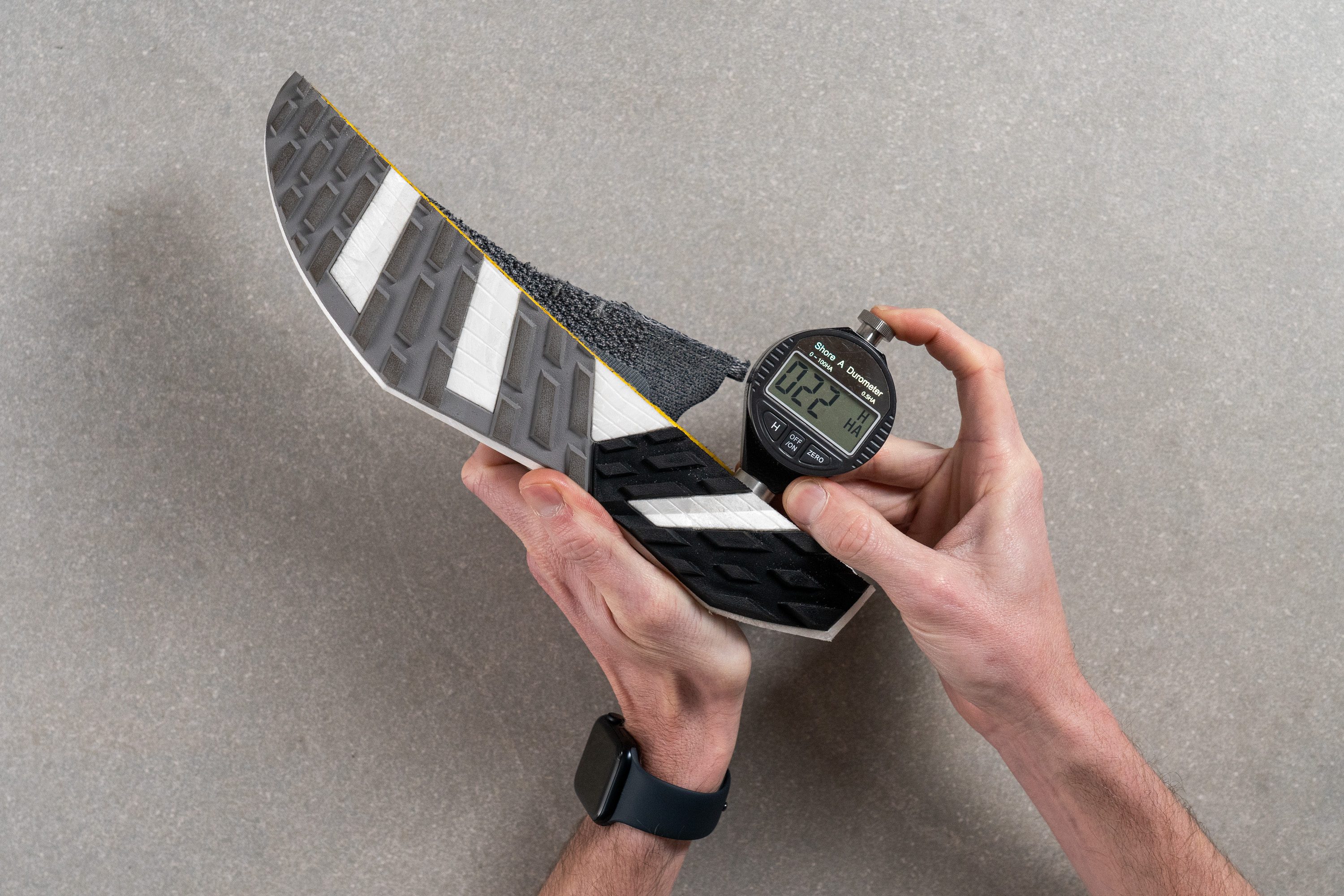
While the midsole is a Bio-Pebax foam made from castor beans, it doesn't retain the same qualities as its non-bio formulation; namely, the responsiveness we've come to expect from Pebax foams like Nike's ZoomX as found in the Invincible Run FlyKnit 3.
| Tree Flyer 2 | 22.0 HA |
| Average | 20.4 HA |
Size and fit
Size
Allbirds Tree Flyer 2 fits slightly small (12 votes).
Internal length
| Tree Flyer 2 | 273.0 mm |
| Average | 269.4 mm |
Width / Fit
A predictable and accommodating fit is what you can expect in the Tree Flyer 2. The shoe doesn't bring any surprises in its standard D medium width which is reflected in the gel mould of its interiors.
In the widest part of the mould, our calliper recorded a standard reading of 95.7 mm. This is on par with the average of running shoes.
However, runners with wider feet or bunions who need a little more wiggle room to avoid hotspots should consider the roomier Allbirds Tree Dasher 2 instead.
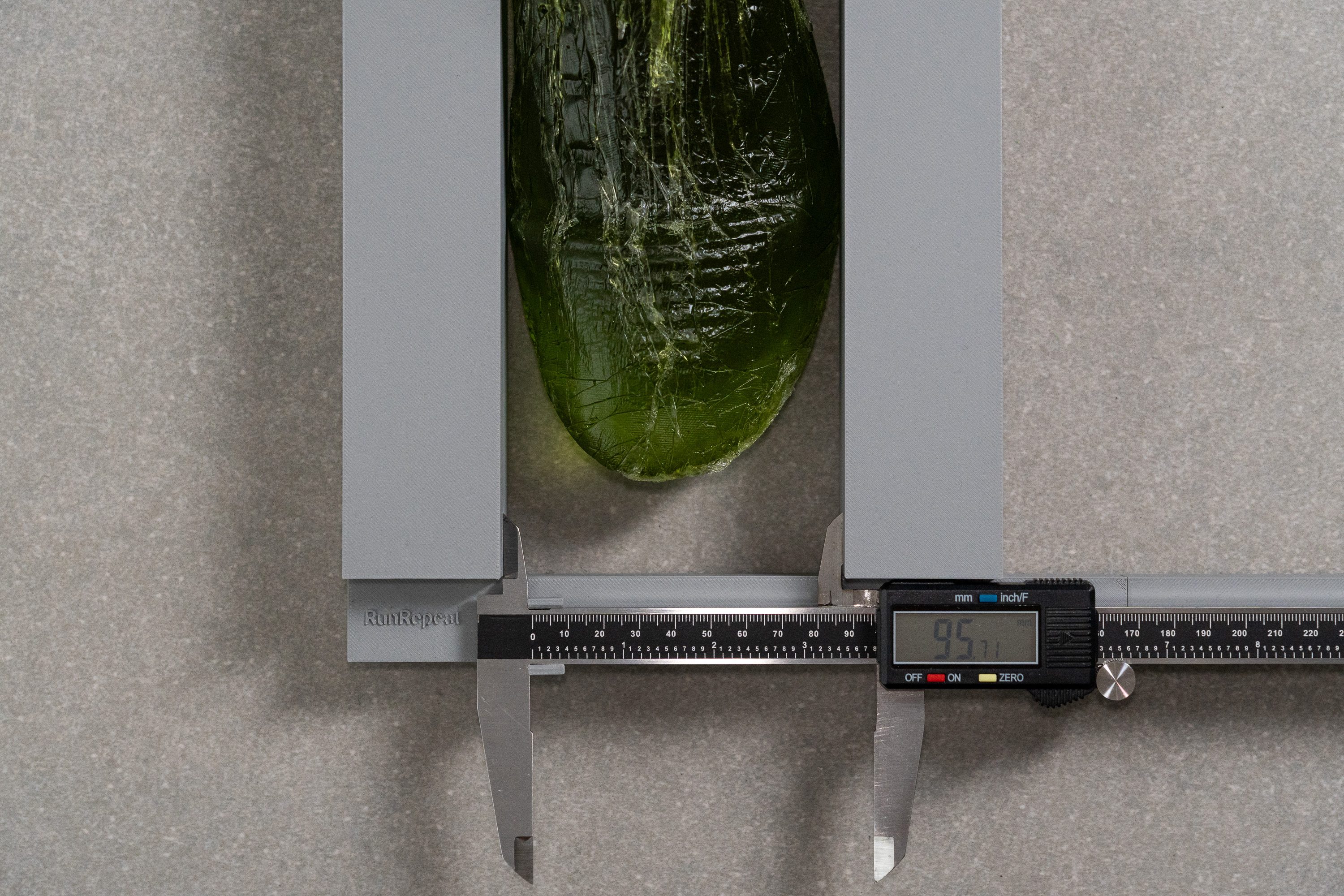
| Tree Flyer 2 | 95.7 mm |
| Average | 95.2 mm |
Toebox width
Moving up to the area around the big toe, we measured the width of the Tree Flyer 2's toebox at 71.6 mm. This is slightly below the average but still within the medium range. We had sufficient room to splay out the toes without butting up against the upper.
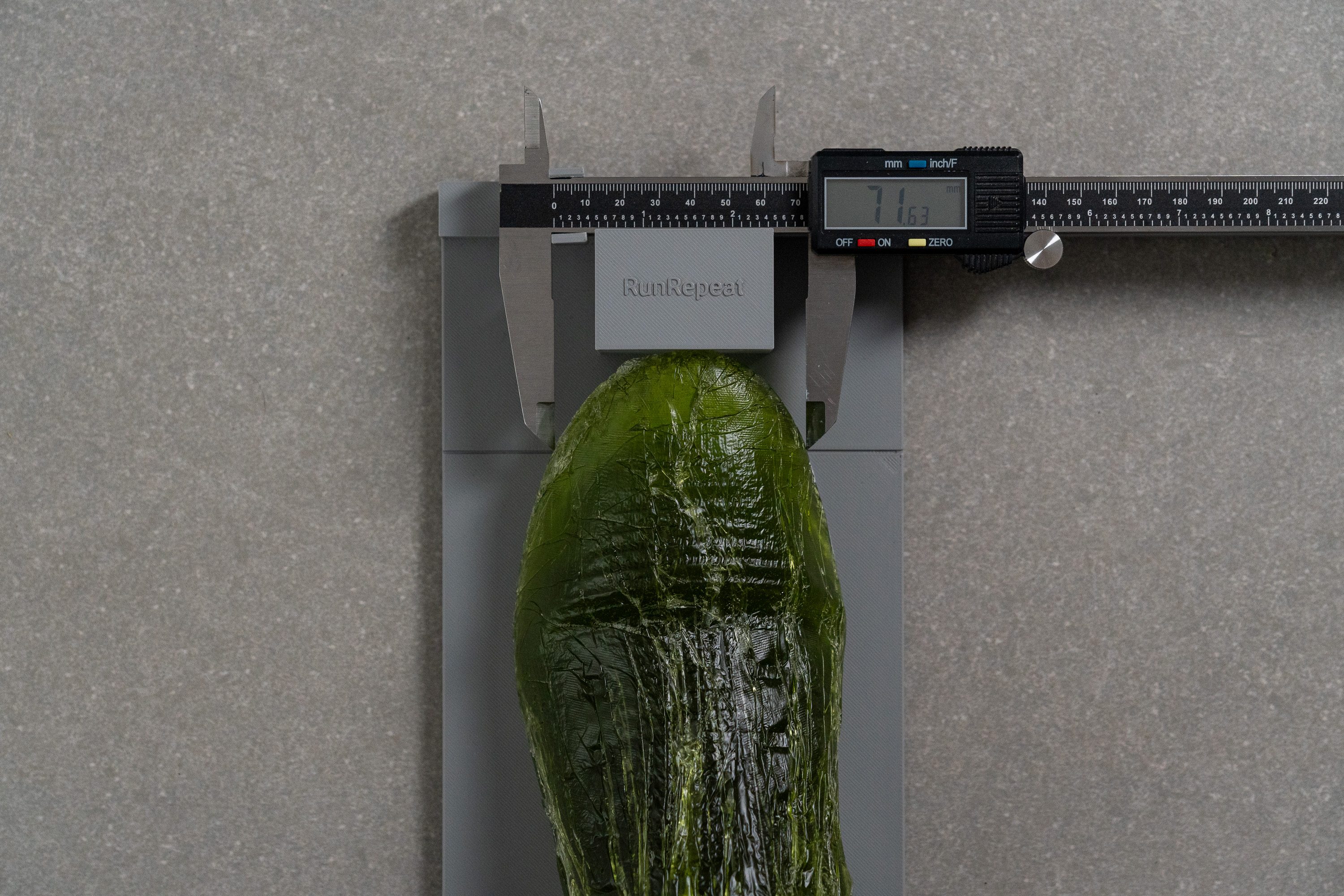
| Tree Flyer 2 | 71.6 mm |
| Average | 73.3 mm |
Toebox height
A protective toe overlay steals a couple of milimeters from the shoe's vertical space but doesn't affect the fit as critically. At 24.8 mm, it is only slightly shallower than average.
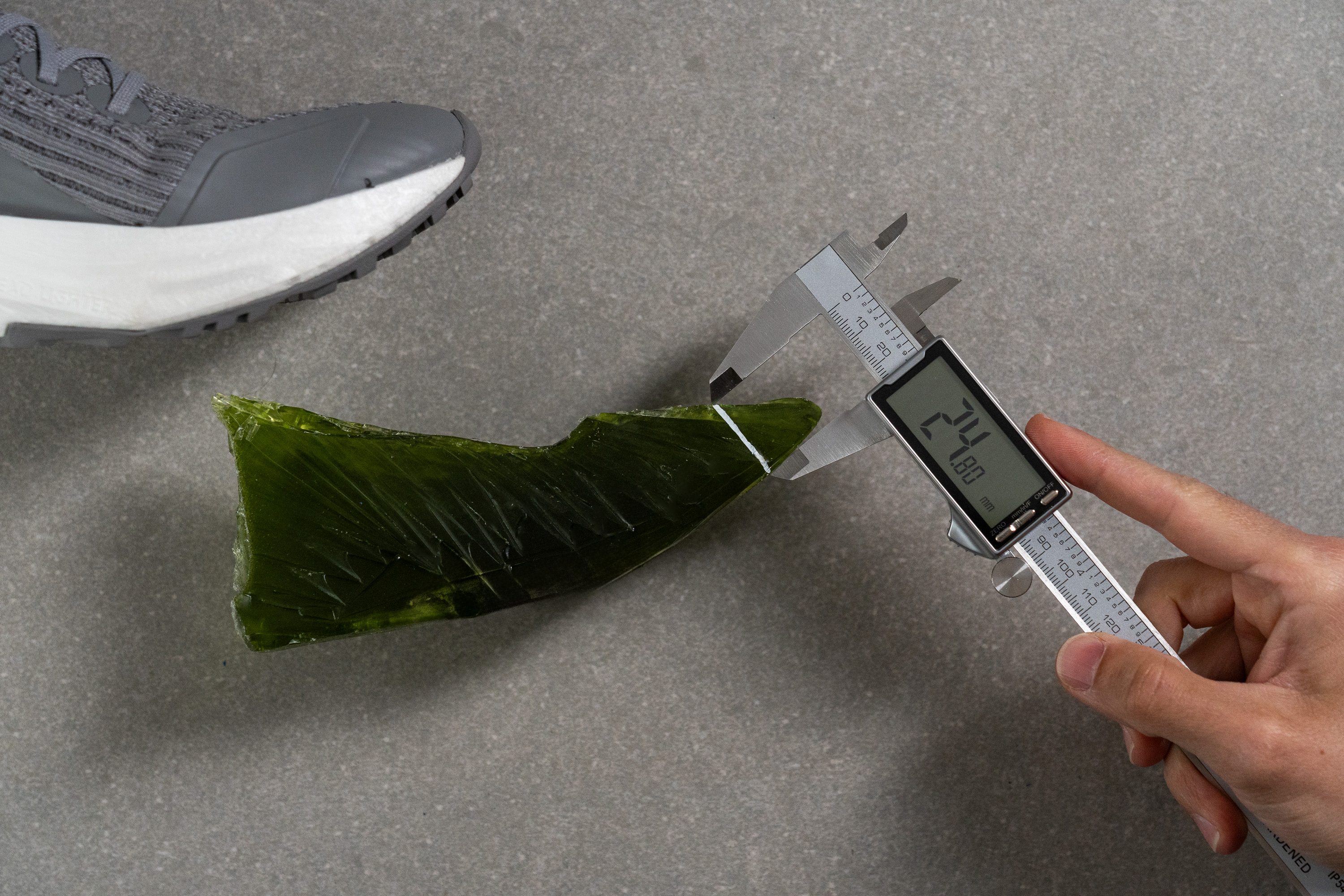
| Tree Flyer 2 | 24.8 mm |
| Average | 27.1 mm |
Flexibility / Stiffness
We secured the Tree FLyer 2 to our workbench and used a force gauge to find that only 24.1N of force is needed to bend the shoe to 90 degrees.
This is more flexible than the average road shoe and means that the Tree Flyer 2 is able to bend along with our foot with relative ease. This contributes to the shoe's easy and forgiving ride which makes it easy to wear the shoe comfortably for extended periods.
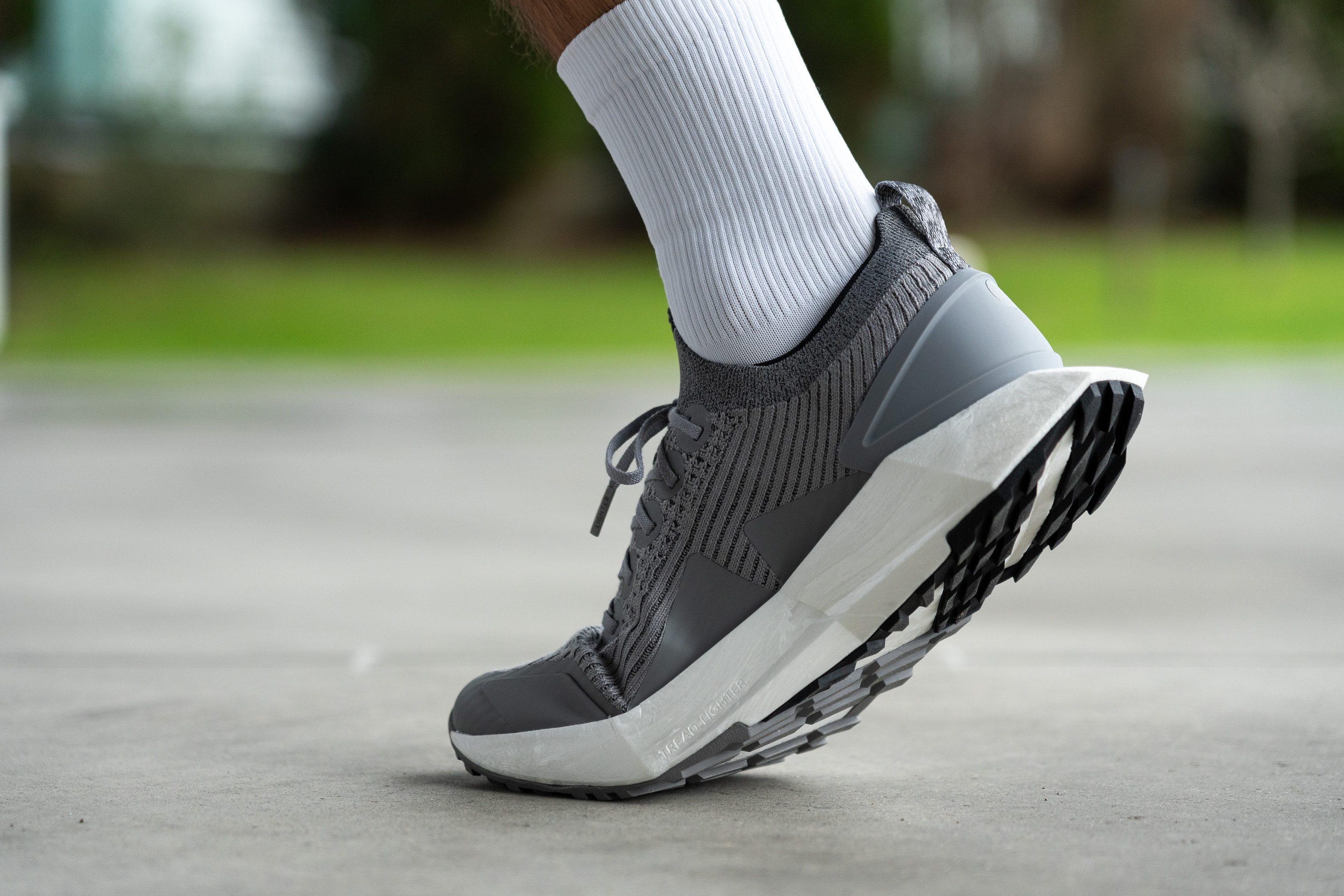
This test follows an older methodology, which is why you don't see recently tested shoes in the chart. Results from different methodologies can not be compared.
| Tree Flyer 2 | 24.1N |
| Average | 28.1N |
Stiffness in cold (%)
We also repeated the flex test after letting the shoe chill in the freezer for twenty minutes and found that it only became 8.2% stiffer when exposed to the cold. This is much more consistent than the average shoe under similar conditions which, in combination with the midsole's post-freezer test, makes the shoe a decent winter training partner. We say, "decent", as the shoe's relatively high breathability means that we'll likely suffer from cold feet in extremely frigid weather. However, a warm pair of socks could help stave off frostbitten toes.
| Tree Flyer 2 | 8% |
| Average | 33% |
Weight
While its name implies a lightweight frame for fluttering through our daily runs, the Tree Flyer 2 is actually heavier than the average road shoe at 10.3 oz (293g). That said, it didn't feel overly bulky during our test runs or while walking around in this shoe.
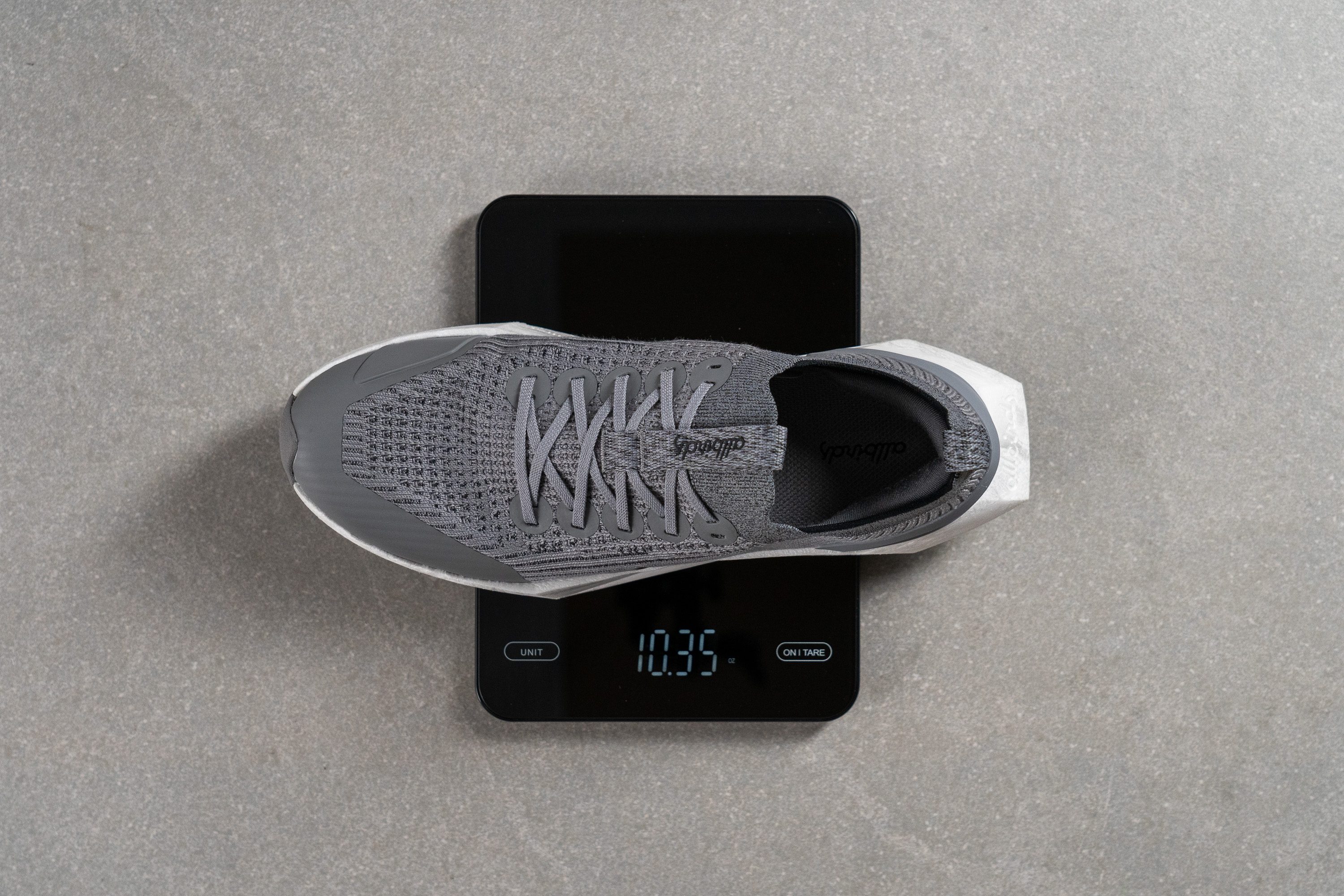
| Tree Flyer 2 | 10.3 oz (293g) |
| Average | 9.3 oz (264g) |
Breathability
To test the breathability of the Tree Flyer 2, we sealed the shoe and pumped it full of smoke. As we can see, the smoke is able to filter through the shoe's upper with relative ease, leading us to give it a score of 4 out of 5 in this assessment. As such, the Tree Flyer 2 is a good companion for runs on warm days as it won't trap heat in like a foot sauna.
This well-ventilated nature is easy to understand when looking at a backlit cross-section of the Tree Flyer 2 and seeing how easily the light shines through the many large pores that dot the shoe's upper.
The knit upper itself is made from eucalyptus tree fibres that seem to be quite densely woven but still allow air to flow through the shoe and vent out any heat generated as we run.
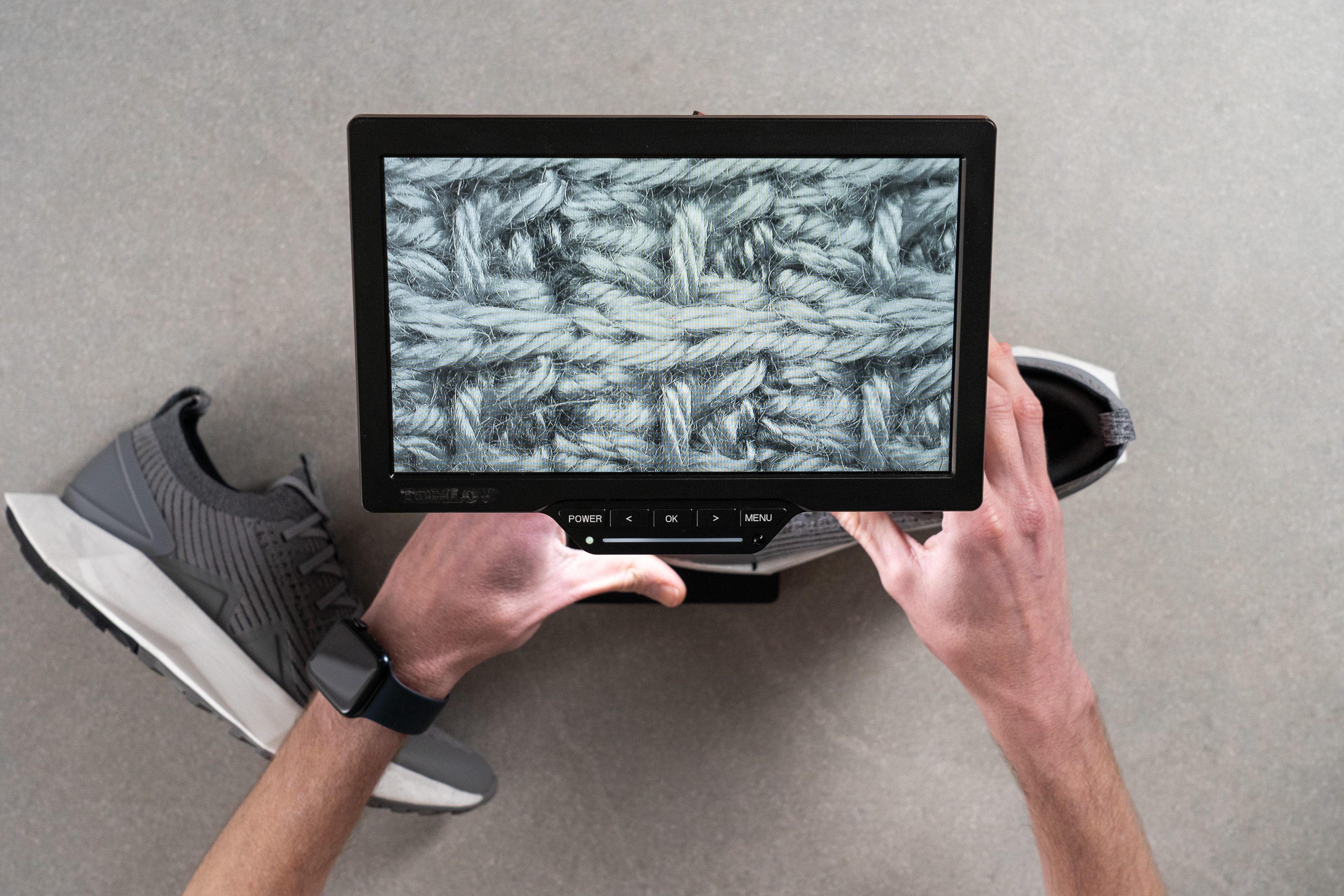
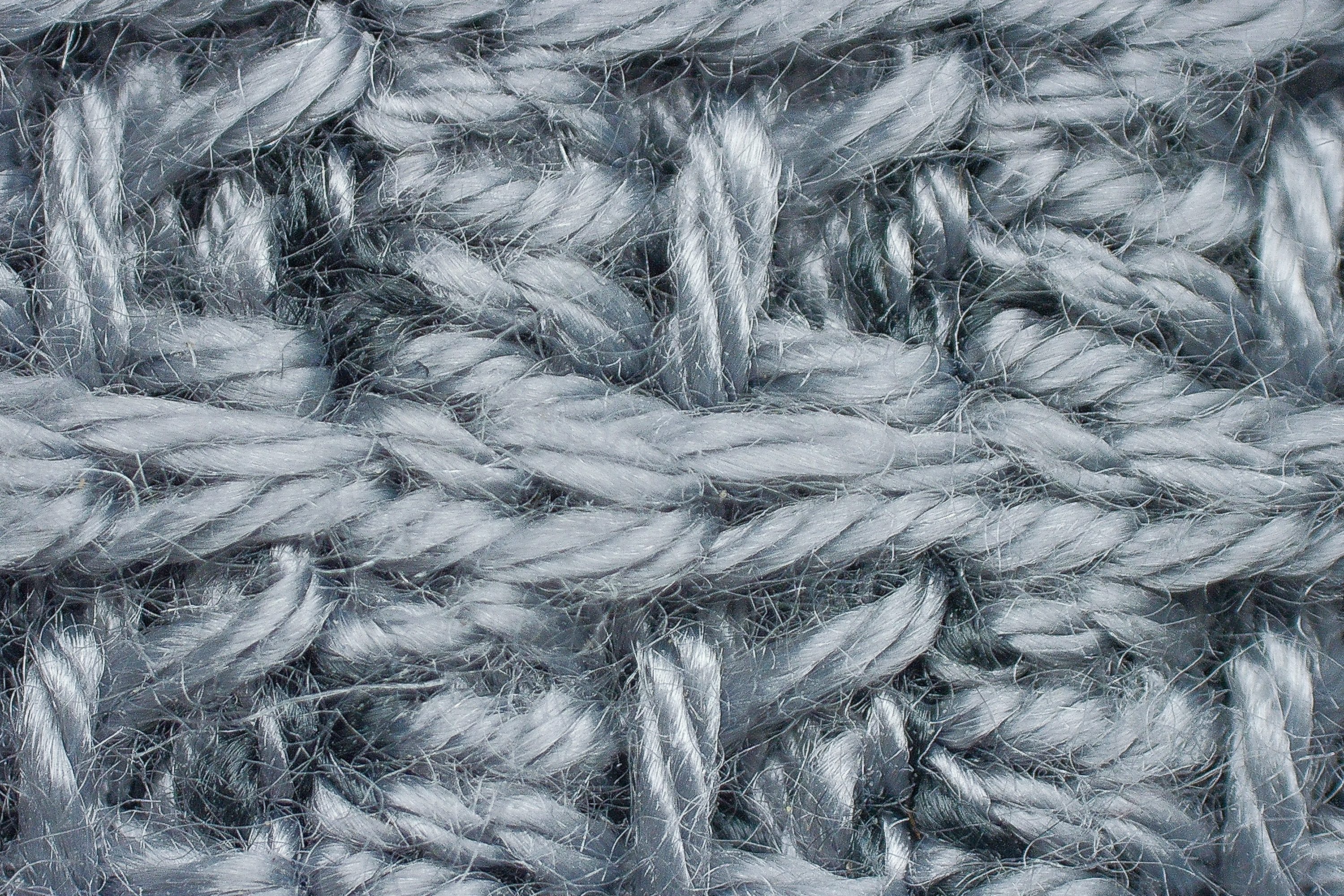
| Tree Flyer 2 | 4 |
| Average | 3.7 |
Stability
Lateral stability test
The Tree Flyer 2 feels grounded as we shift our weight from side to side in the shoe. However, as a neutral shoe with no guidance features, it does little to mitigate excessive lateral movements, making it less than ideal for those with pronounced overpronation. That said, we didn't experience any major instability during testing.
Torsional rigidity
The Tree Flyer 2 put up a relatively high level of resistance as we bent and twisted it in our hands, leading us to give it a torsional rigidity score of 4 out of 5. This feels quite comfortable underfoot as it allows for some natural twisting of our foot while still providing a sturdy and level landing surface for surefooted landings.
| Tree Flyer 2 | 4 |
| Average | 3.5 |
Heel counter stiffness
Despite the external heel counter being made of a seemingly solid TPU overlay, we found it to be relatively pliable in our manual assessment, leading us to give it a middle-of-the-road stiffness score of 3 out of 5. This also feels quite comfortable as it holds our foot in place nicely without putting too much pressure on our heels and tendons.
| Tree Flyer 2 | 3 |
| Average | 2.9 |
Midsole width - forefoot
We measured the Tree Flyer 2's midsole to be 116 mm wide at the forefoot, making it quite a bit broader than our current lab average.
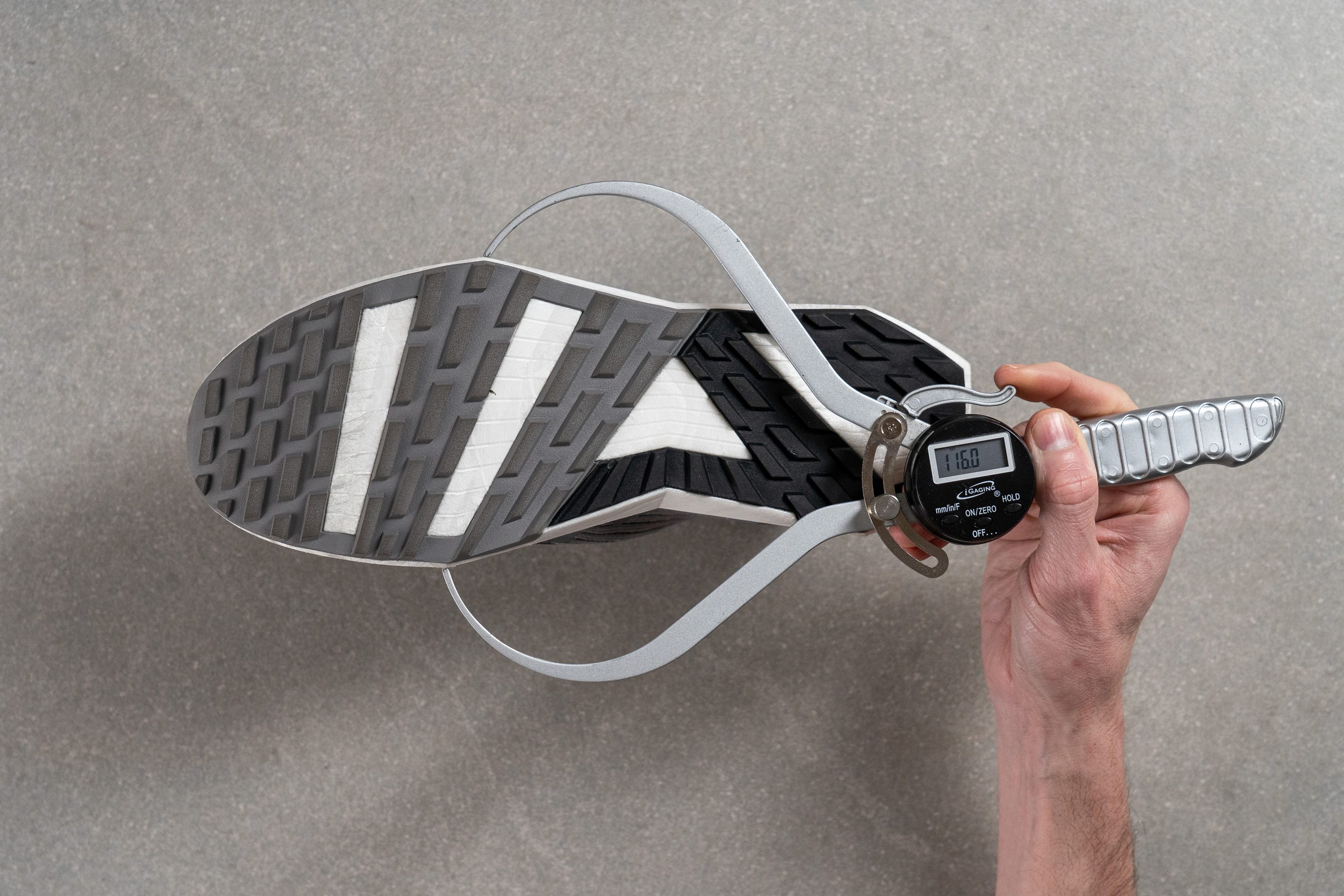
| Tree Flyer 2 | 116.0 mm |
| Average | 114.4 mm |
Midsole width - heel
The midsole isn't quite as robust at the heel which measures 88.8 mm wide. While this is narrower than our current lab average, it should still be enough of a platform for heel strikers to enjoy stable landings in this shoe.
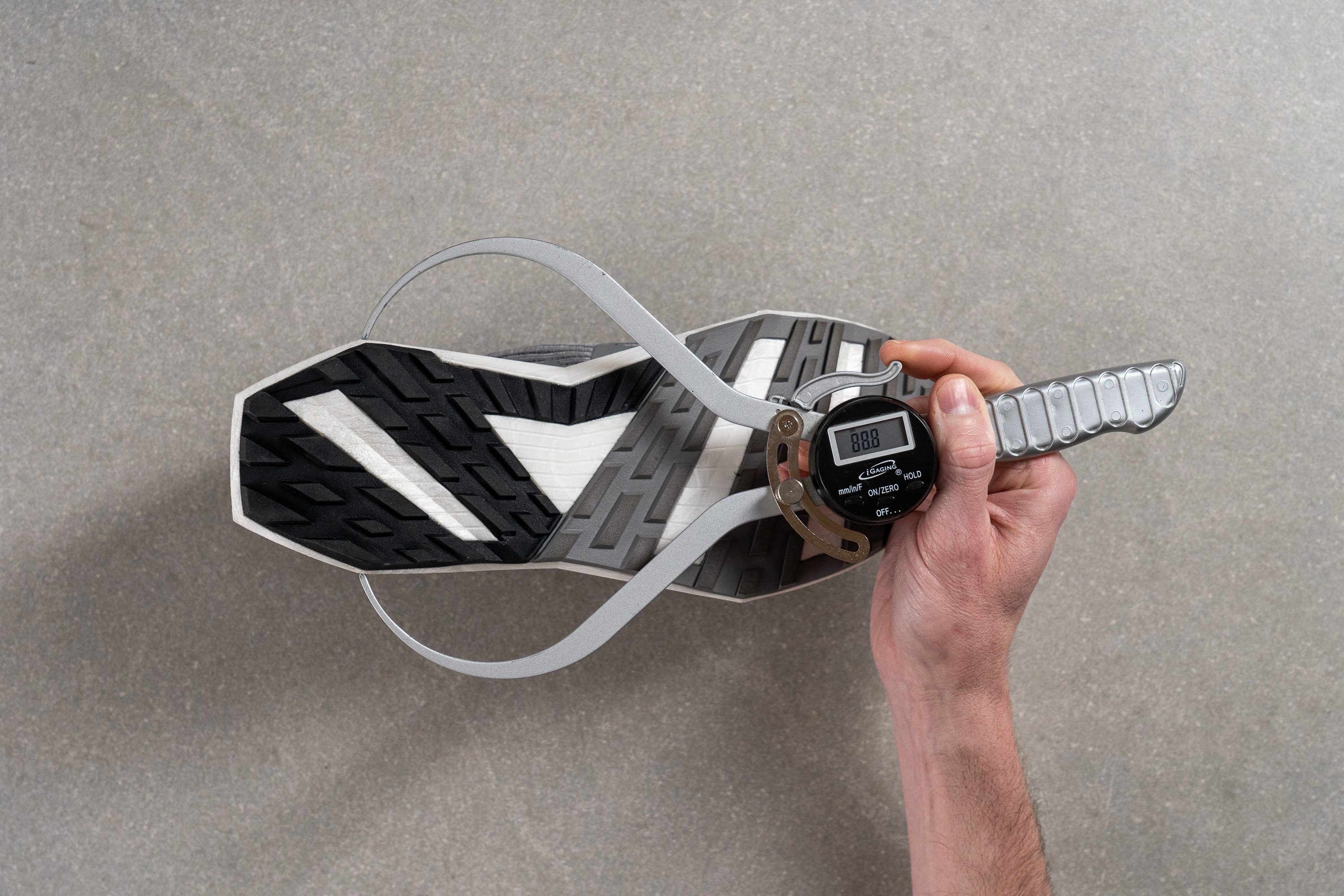
| Tree Flyer 2 | 88.8 mm |
| Average | 90.6 mm |
Durability
Toebox durability
Interestingly for a road shoe, the Tree Flyer 2 has a bio-based TPU overlay that acts as a toe bumper with the aim of protecting the fragile knit upper. To put this protective layer to the test, we fired up our Dremel to 5K RPM and set it against the toebox with 3.2N of force.
Powering down our tool after the four-second test, we were pleased to find that the overlay actually held up to the relentless grinding and was only left with a small indent at the point of contact. This leads us to give the Tree Flyer 2 a perfect 5 out of 5 for toebox durability.
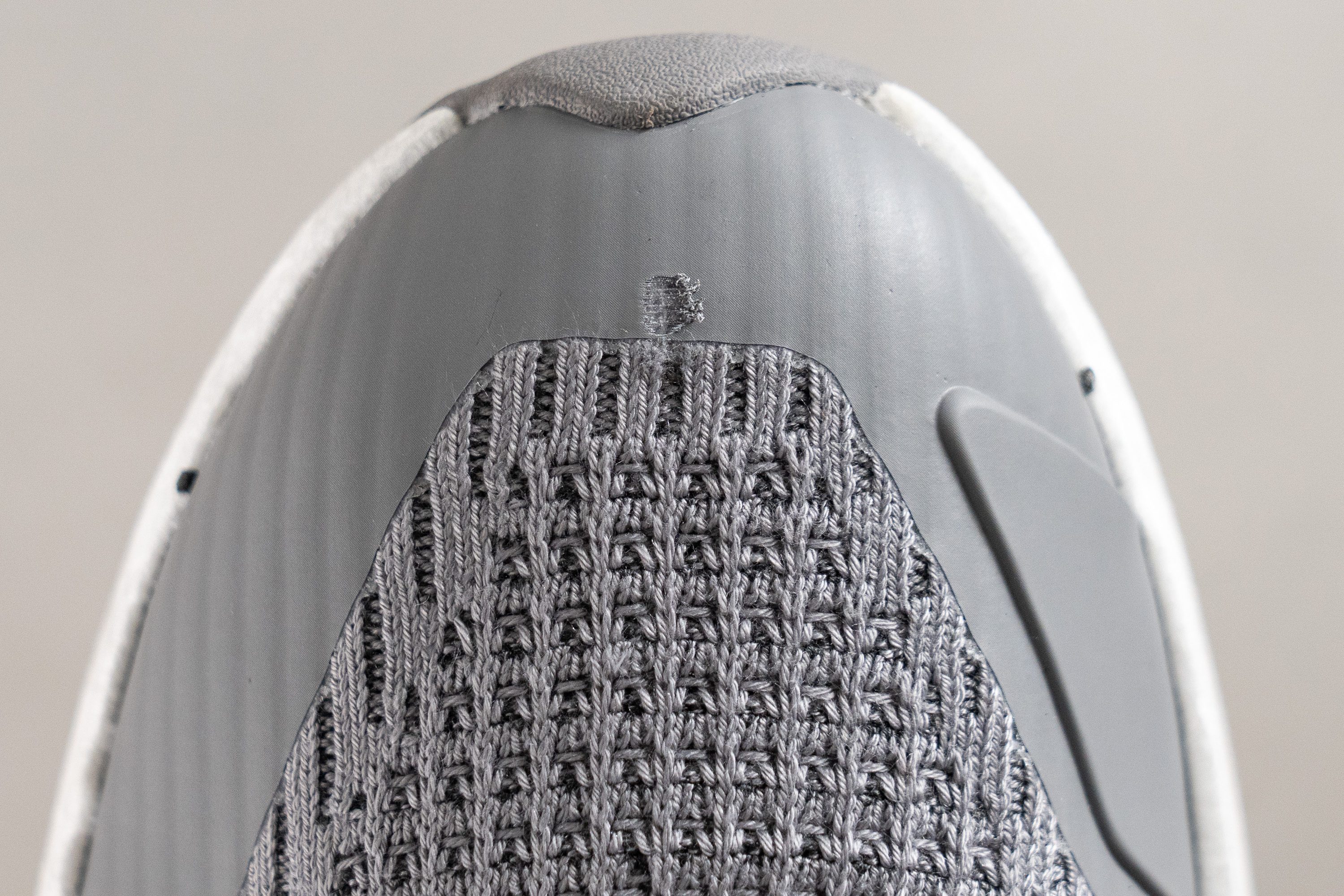
| Tree Flyer 2 | 5 |
| Average | 2.6 |
Heel padding durability
The heel collar didn't fare nearly as well against the Dremel which made quick work of mincing through the lining material.
In the wake of the test, we were left with a decently sized rip in the lining out of which our tool managed to syphon out some of the soft padding within. This lacklustre performance leads us to give the Tree Flyer 2 a heel padding durability score of 2 out of 5, meaning that the shoe is susceptible to the friction of heel rubs and shouldn't be used without socks very often.
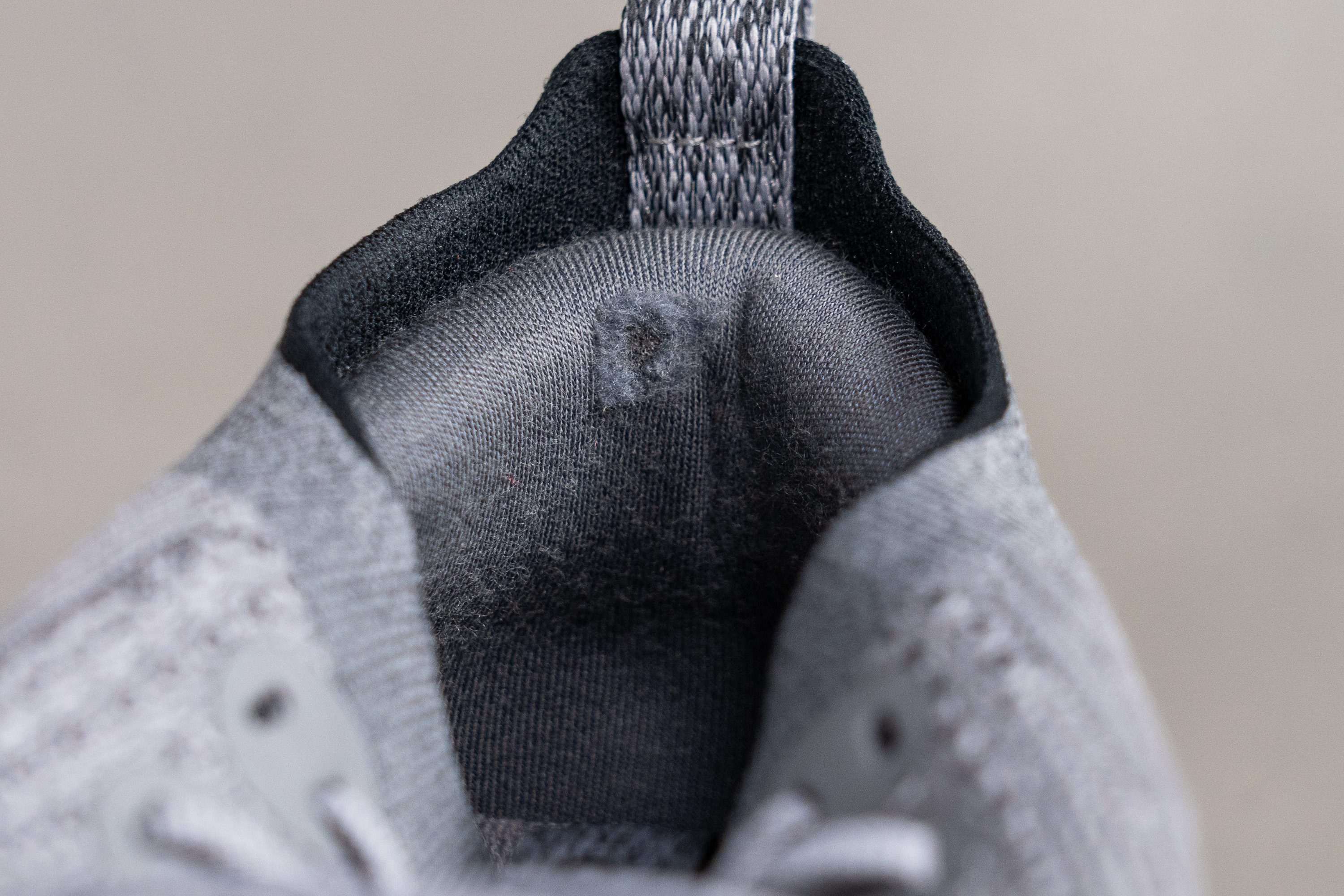
| Tree Flyer 2 | 2 |
| Average | 3.4 |
Outsole hardness
The Tree Flyer 2's outsole is about as hard as average, giving us a durometer reading of 82.9 HC. Throughout the course of testing shoes here in the lab, we found that this level of hardness usually denotes a good balance of grip and durability with only a few exceptions here and there. Let's see if the Tree Flyer 2 is one of them.
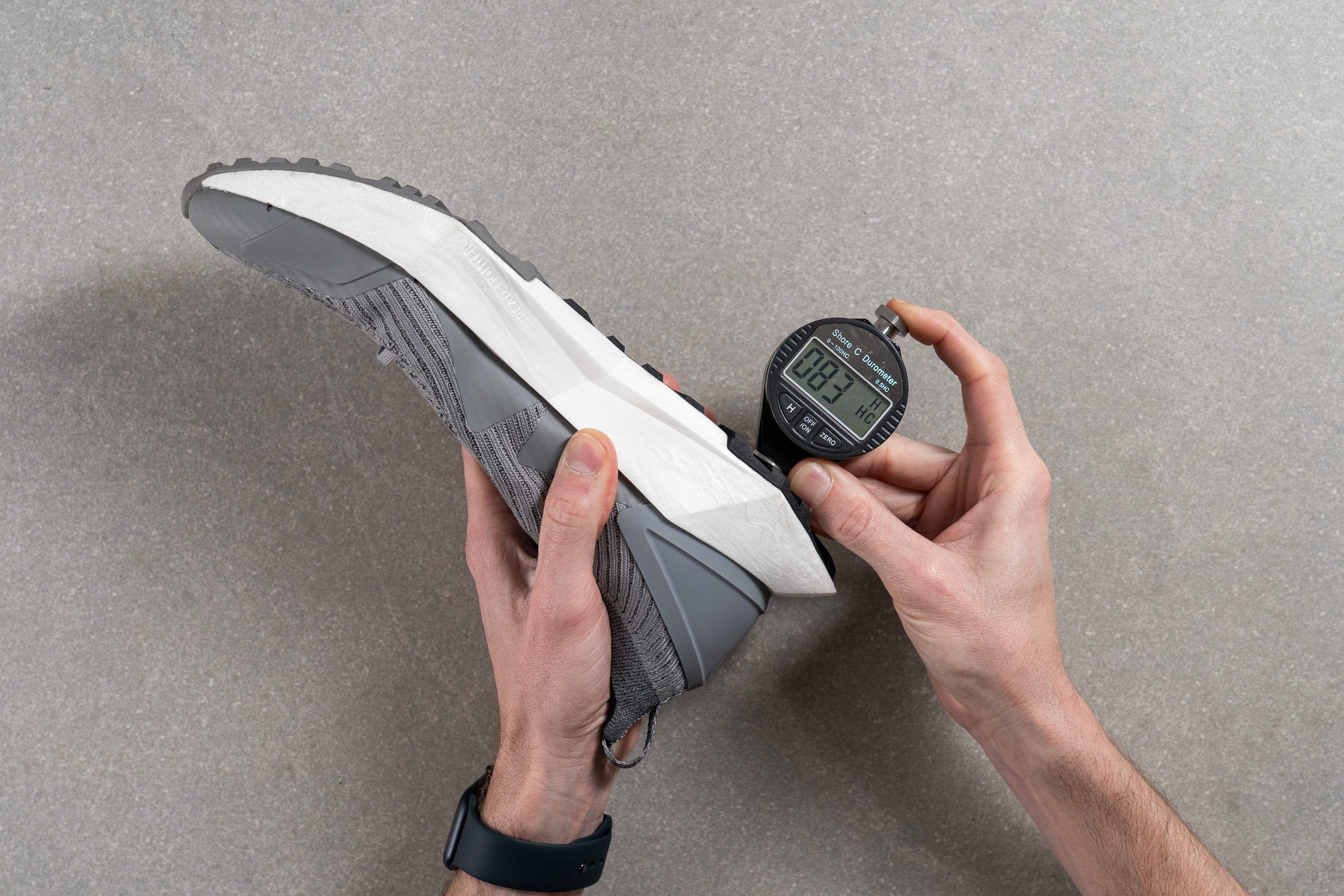
| Tree Flyer 2 | 82.9 HC |
| Average | 79.2 HC |
Outsole durability
Now spinning at a more formidable 10K RPM, we set our Dremel against the Tree Flyer 2's outsole for a total of twenty-two seconds of abrasive force.
Once all was said and done, we used a tyre tread gauge to measure the indentation left behind by our tool and found that only 0.7 mm of material was lost. This is a slightly better performance in this test than the average road shoe and means that we fully expect this shoe to hit the expected shelf life of 400 to 500 miles with some life left in the outsole yet.
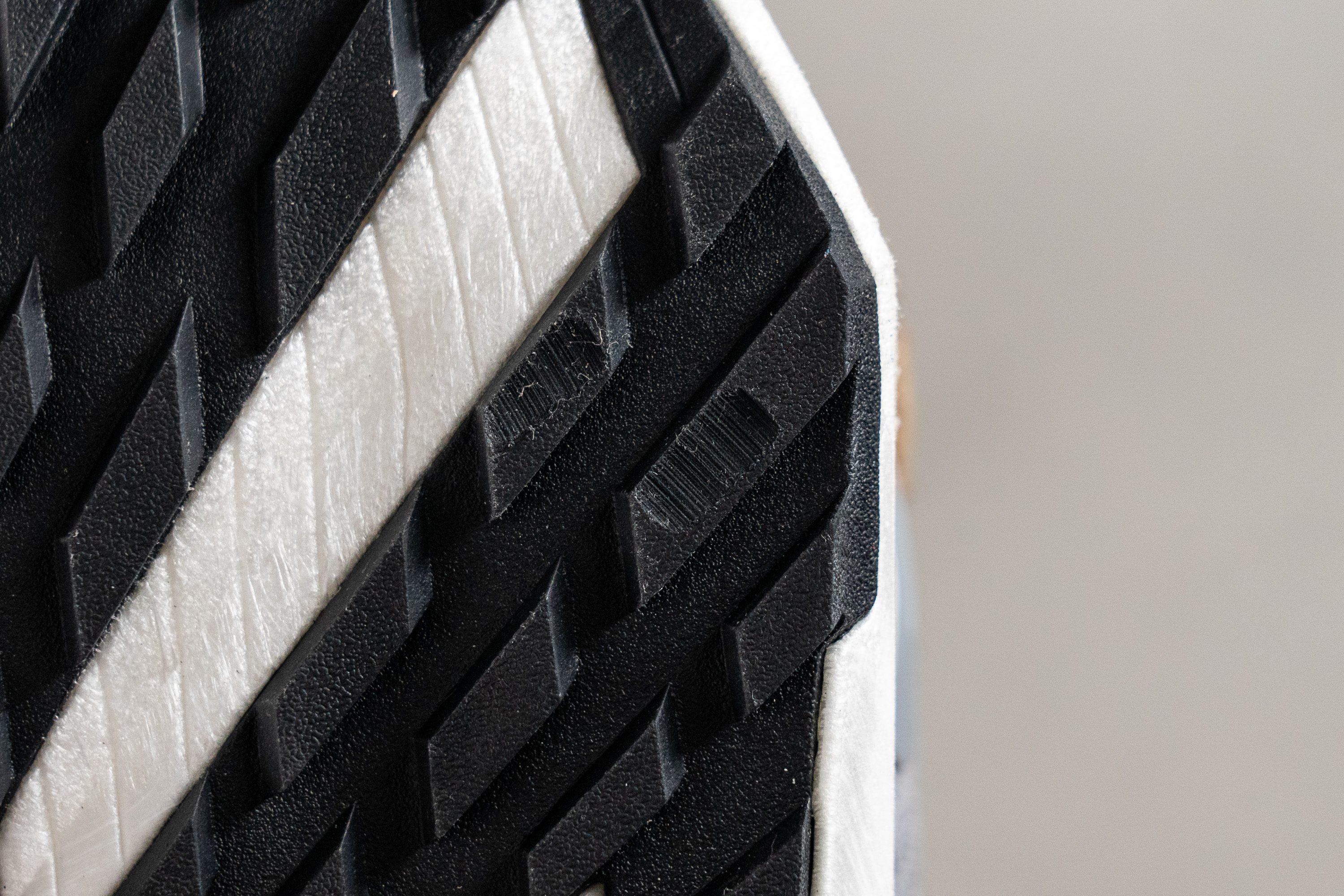
| Tree Flyer 2 | 0.7 mm |
| Average | 1.1 mm |
Outsole thickness
Further contributing to the longevity of the outsole is just how much rubber we have underfoot to burn through before losing traction entirely. At 5 mm thick according to our caliper measurements, the Tree flyer 2's outsole it quite a bit thicker than our current lab average.
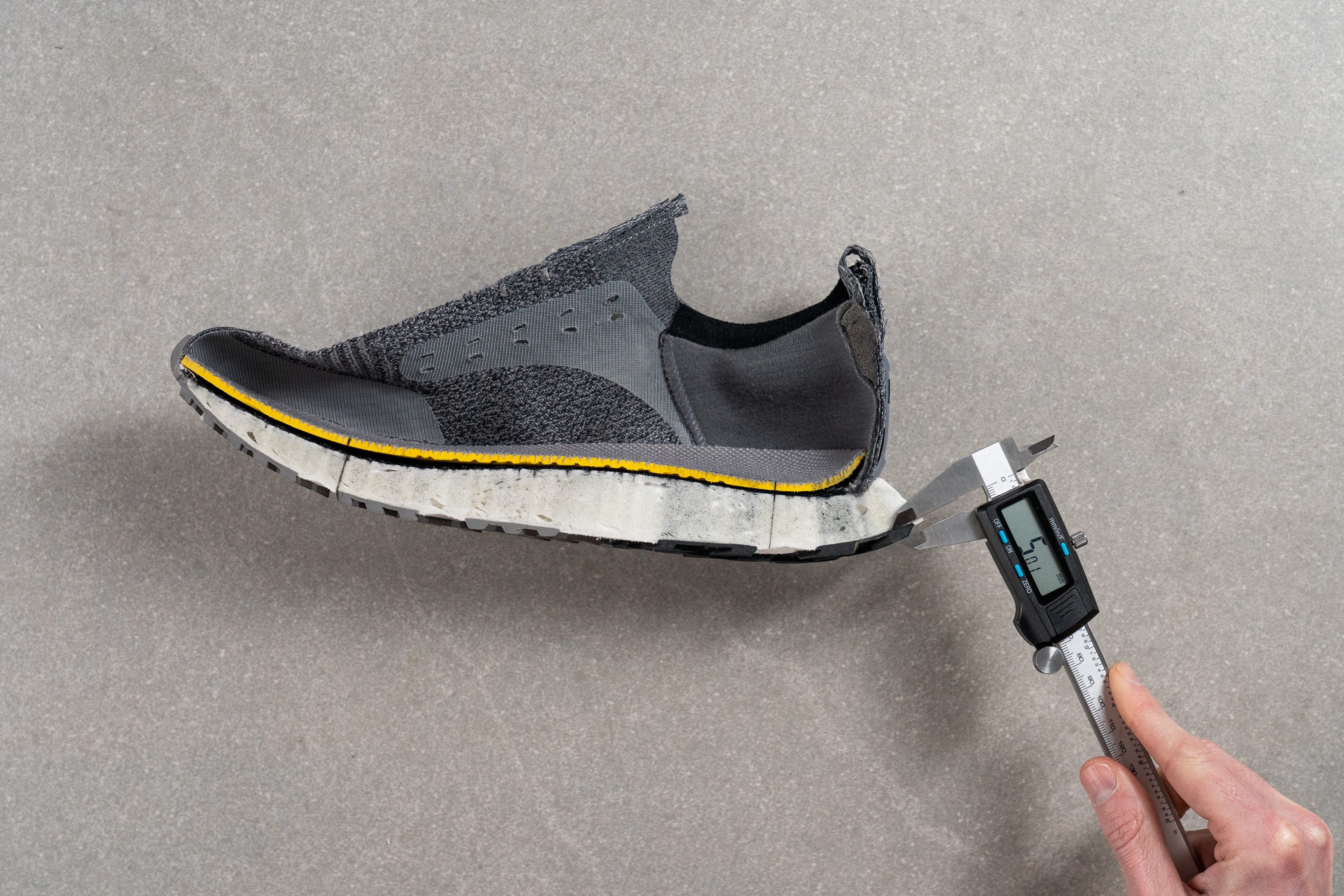
| Tree Flyer 2 | 5.0 mm |
| Average | 3.2 mm |
Misc
Insole thickness
At 3.8 mm thick, the Tree Flyer 2's insole is just shy of our current lab average. That said, it still provides a decently padded footbed for us to sink into as we land in the shoe.
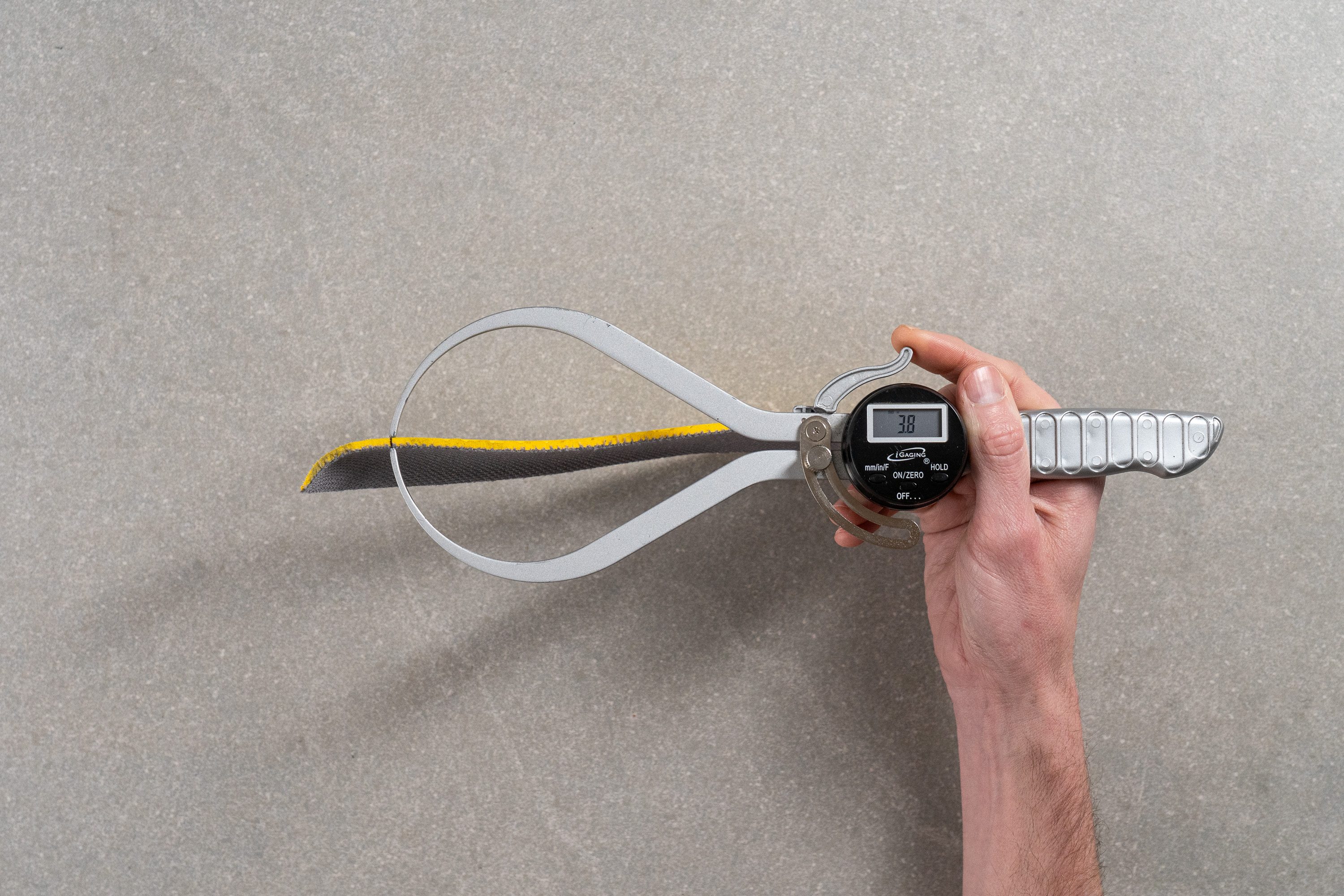
| Tree Flyer 2 | 3.8 mm |
| Average | 4.5 mm |
Removable insole
The Tree Flyer 2's insole isn't glued in, so removing it in favor of a custom orthotic or an aftermarket alternative is possible if needed.
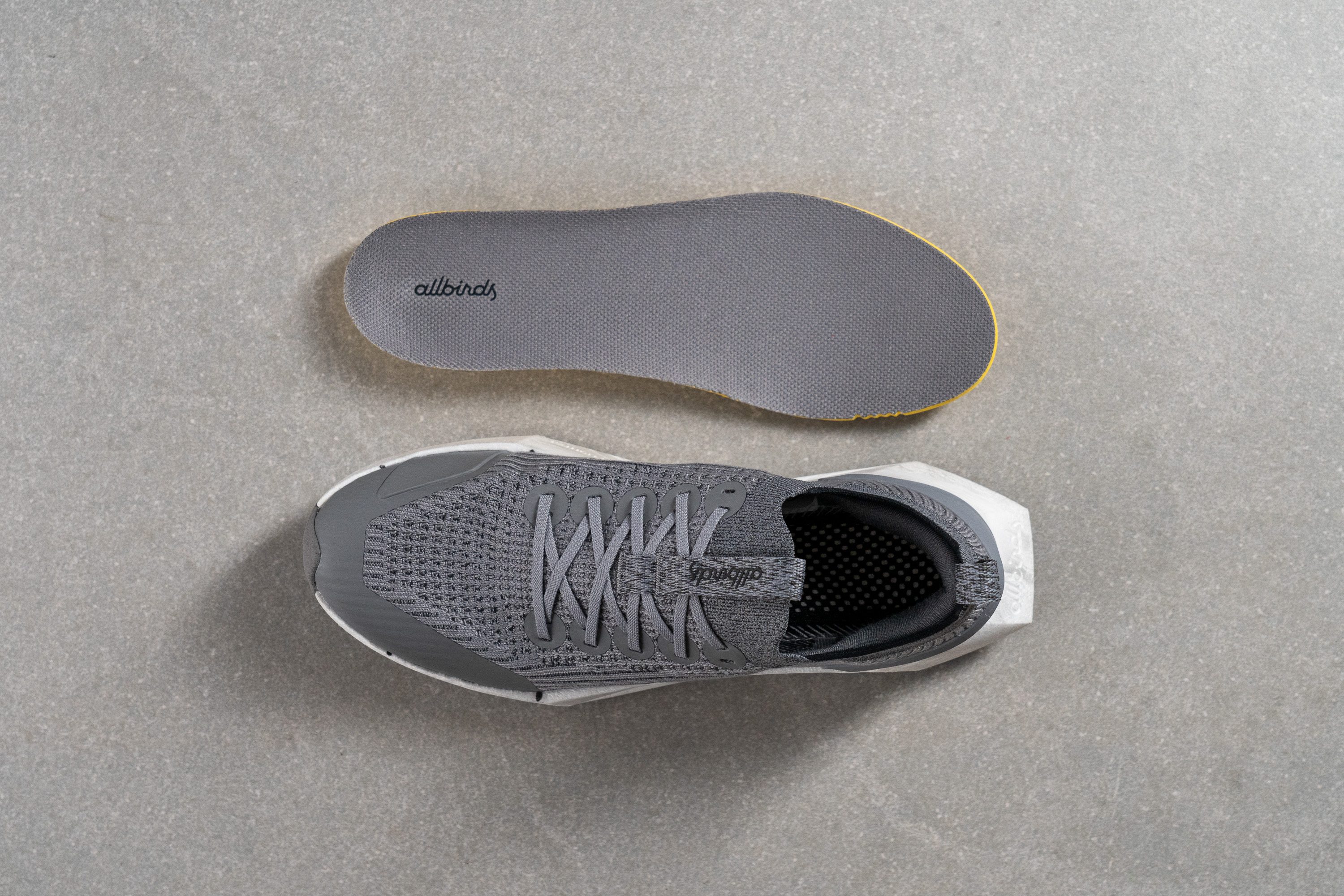
| Tree Flyer 2 | Yes |
Midsole softness in cold (%)
To observe the effects of cold conditions on the midsole, we placed the Tree Flyer 2 in the freezer for twenty minutes and then pressed our durometer against it once more. Becoming only 11.4% firmer in the cold makes the Tree Flyer 2 much more consistent than the average road shoe and means that the cushioning should feel just as soft no matter how low the mercury drops.
| Tree Flyer 2 | 11% |
| Average | 24% |
Reflective elements
Proudly emblazoned at the heel of the Tree Flyer 2 is a small plaque that proudly states the shoe's carbon footprint of only 7.21 kg CO2e and acts as a small reflective element for some minimal nighttime visibility. That said, we still recommend using additional high-vis gear if running along dimly lit roads at night.
| Tree Flyer 2 | Yes |
Tongue padding
With no tongue to measure per se, we pinched our calliper on the material across the instep of the upper and found it to only be 3.4 mm thick.
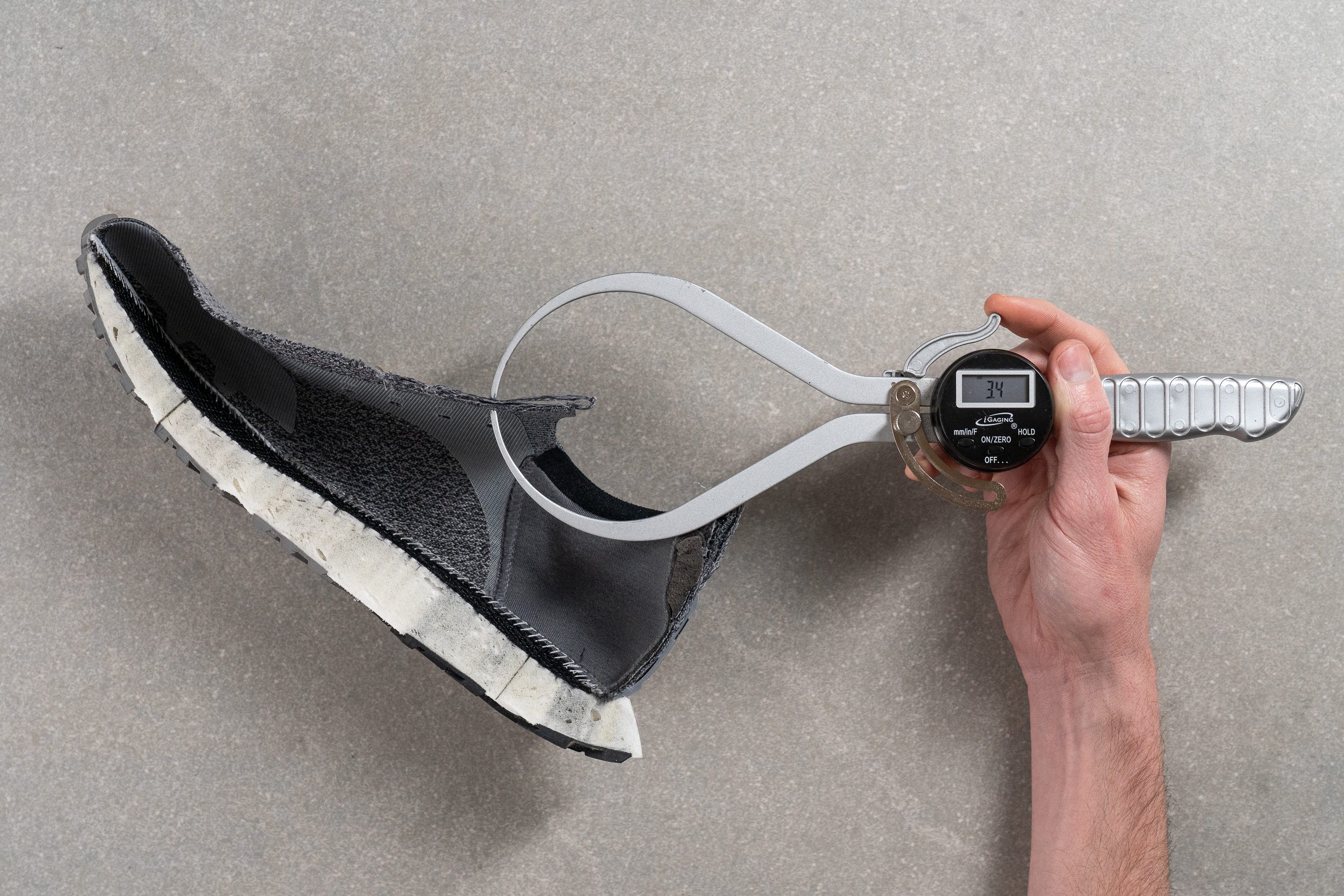
While this isn't paper-thin, we would have greatly appreciated another millimetre or two from this daily trainer so that the laces didn't feel quite as apparent across our instep during testing. That said, using as little material as possible serves to keep some weight off this already chunky shoe and jives with the shoe's environmental ethos.
| Tree Flyer 2 | 3.4 mm |
| Average | 5.7 mm |
Tongue: gusset type
The Tree Flyer 2's one-piece upper construction has a sock-like fit that feels like the shoe warps itself around our foot rather than us simply sitting within. It's stretchy enough to accommodate our foot comfortably while, at the same time, elastic enough to lock us in nicely.
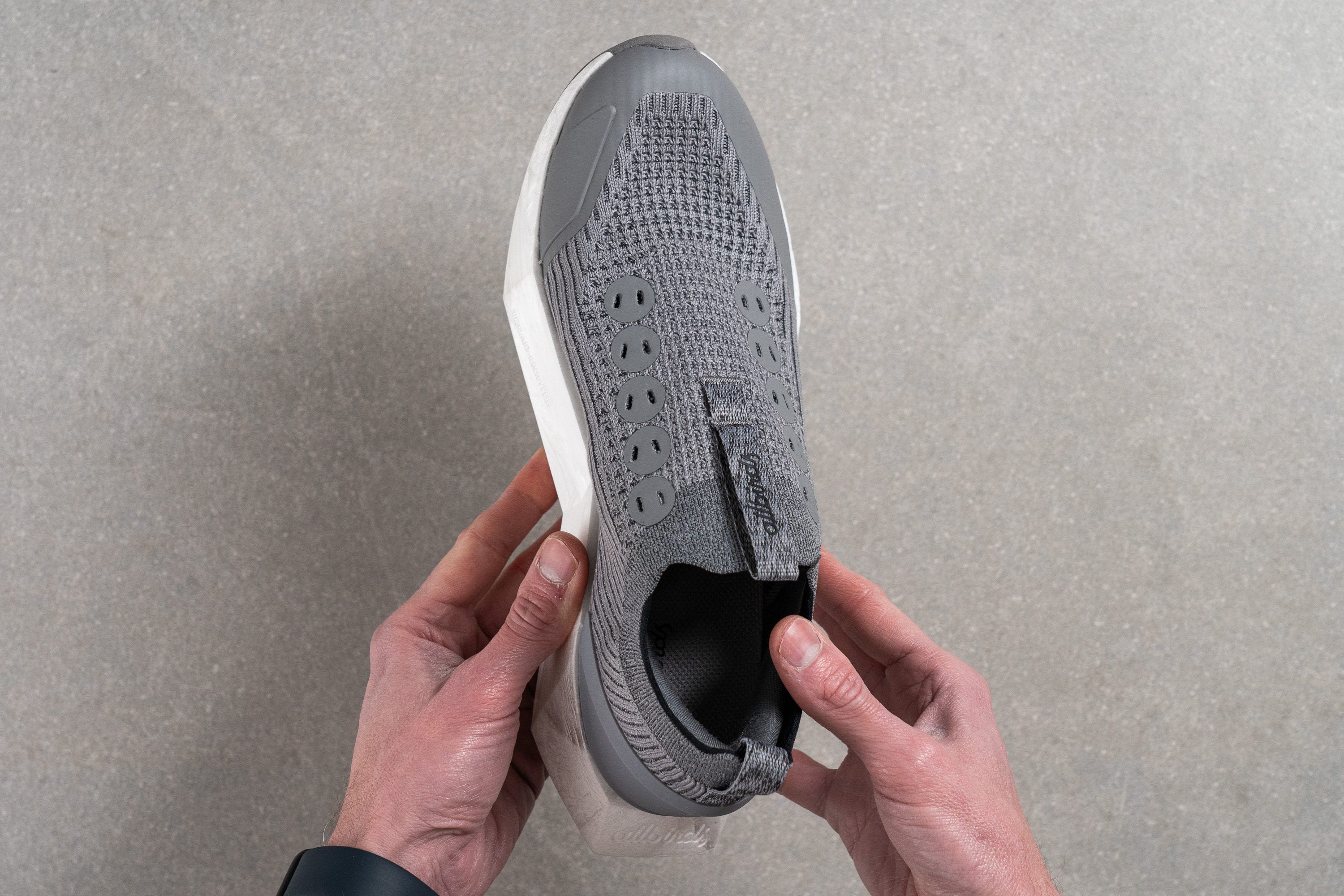
| Tree Flyer 2 | Sock like |
Heel tab
The inclusion of a sleek finger loop at the heel of the Tree Flyer 2 is a nice little detail that helps us slide the shoe on and off a little more easily.
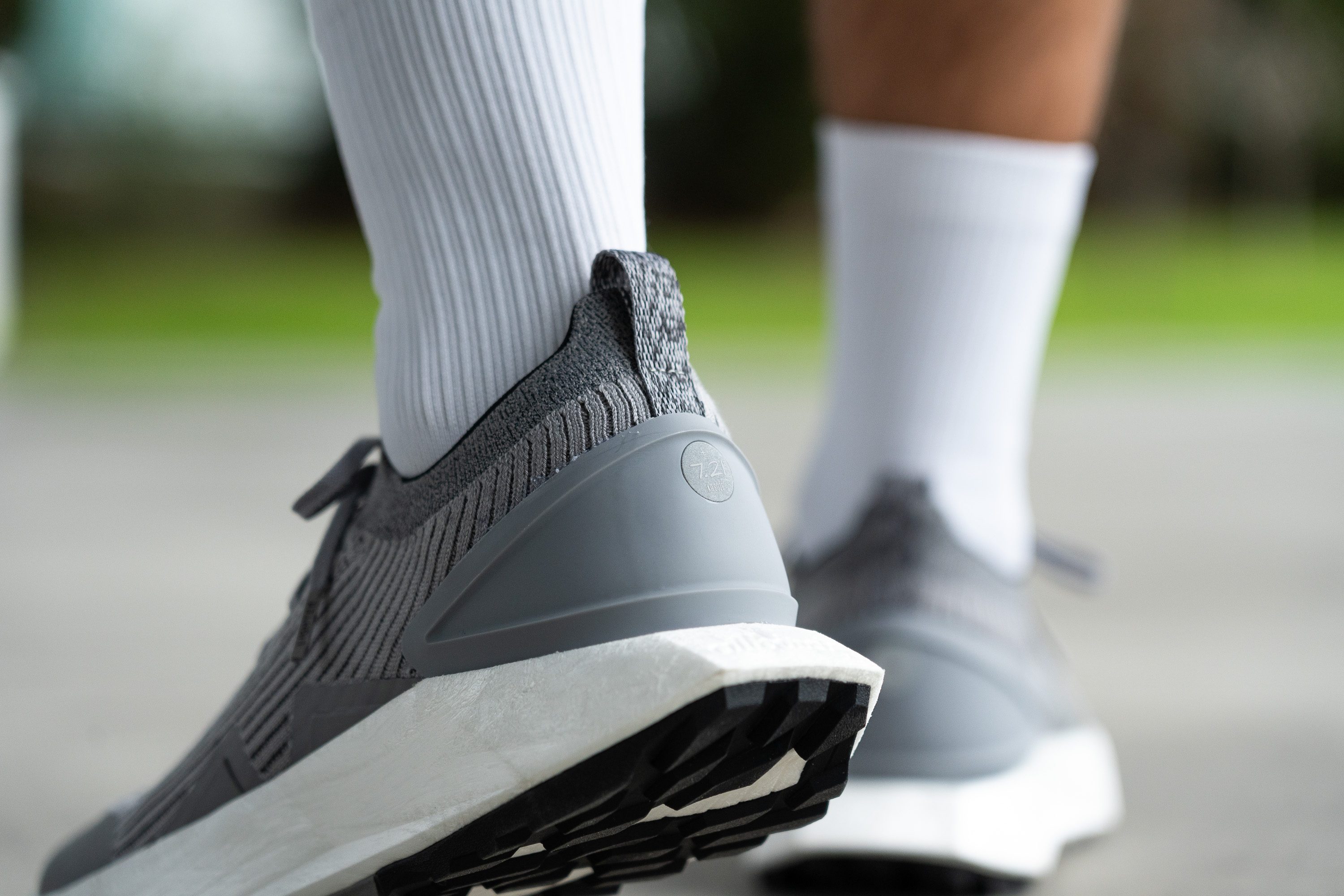
| Tree Flyer 2 | Finger loop |

